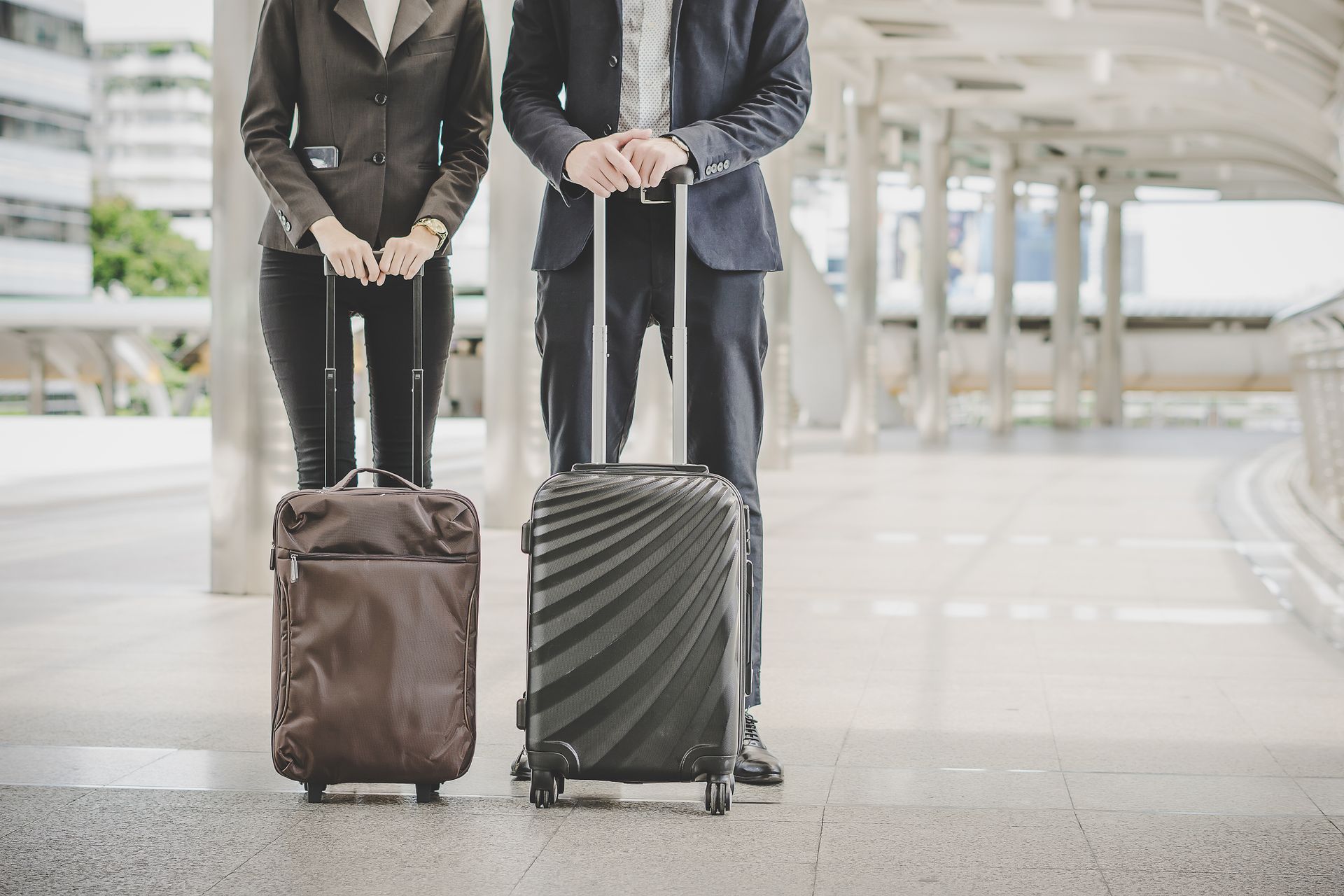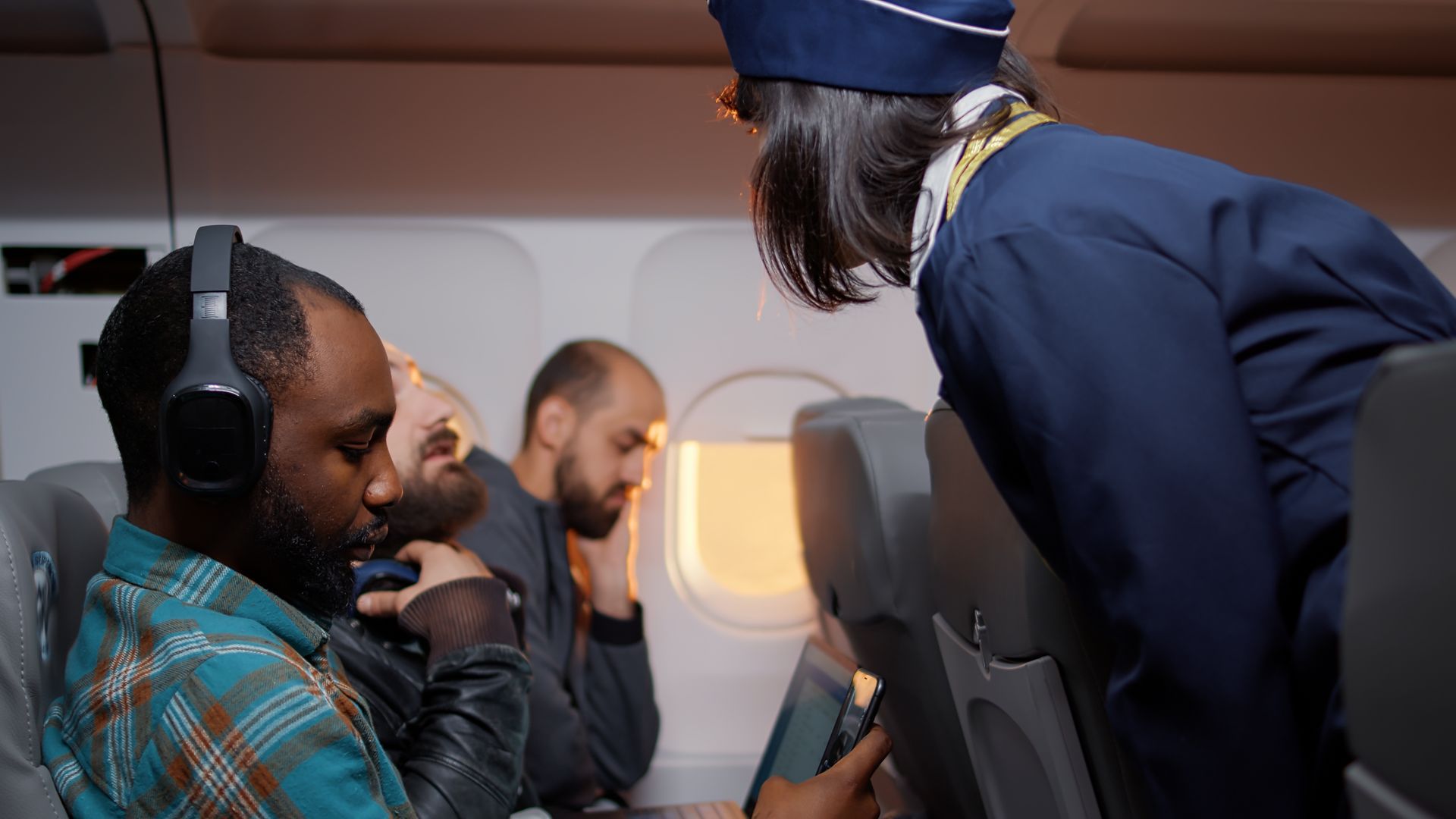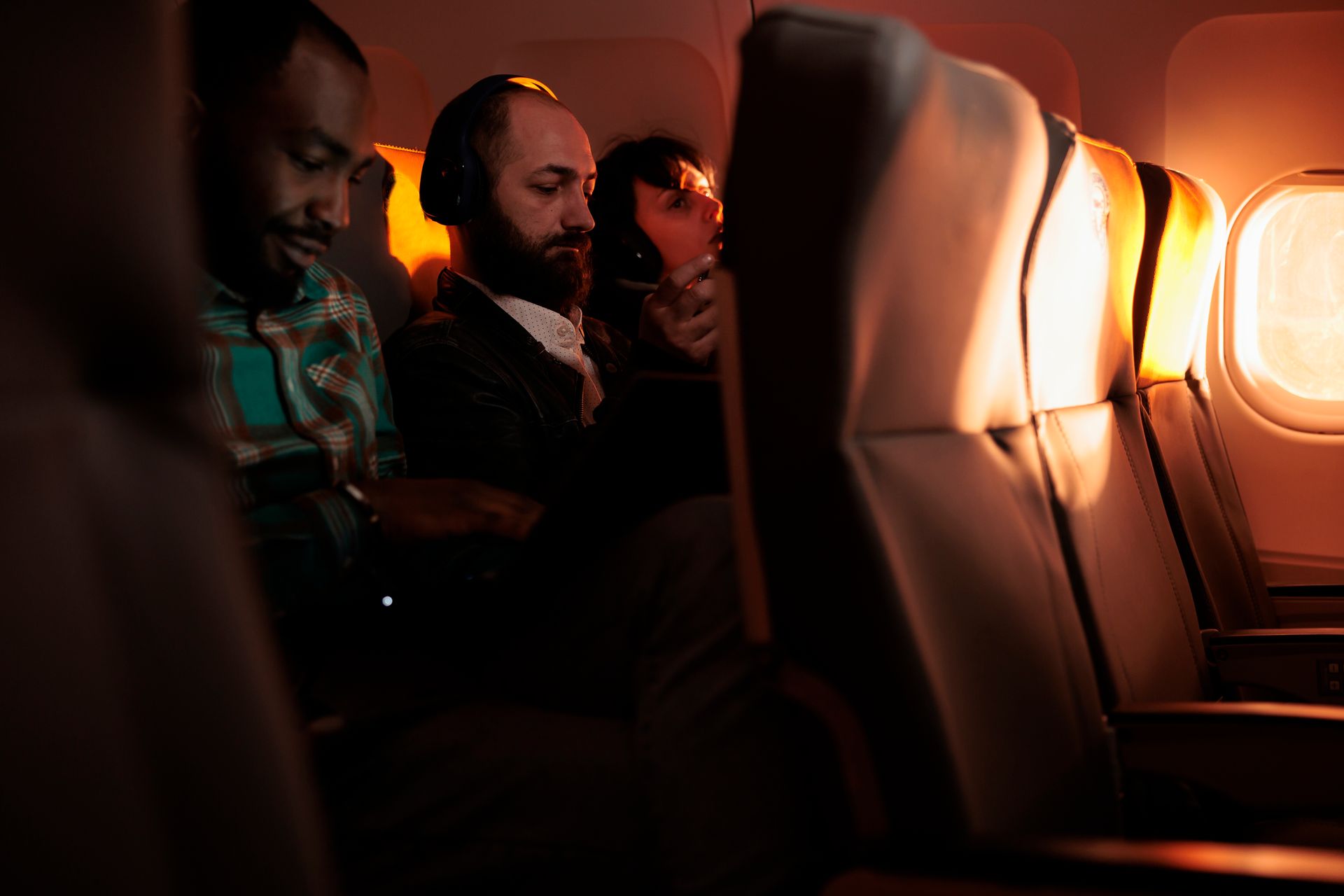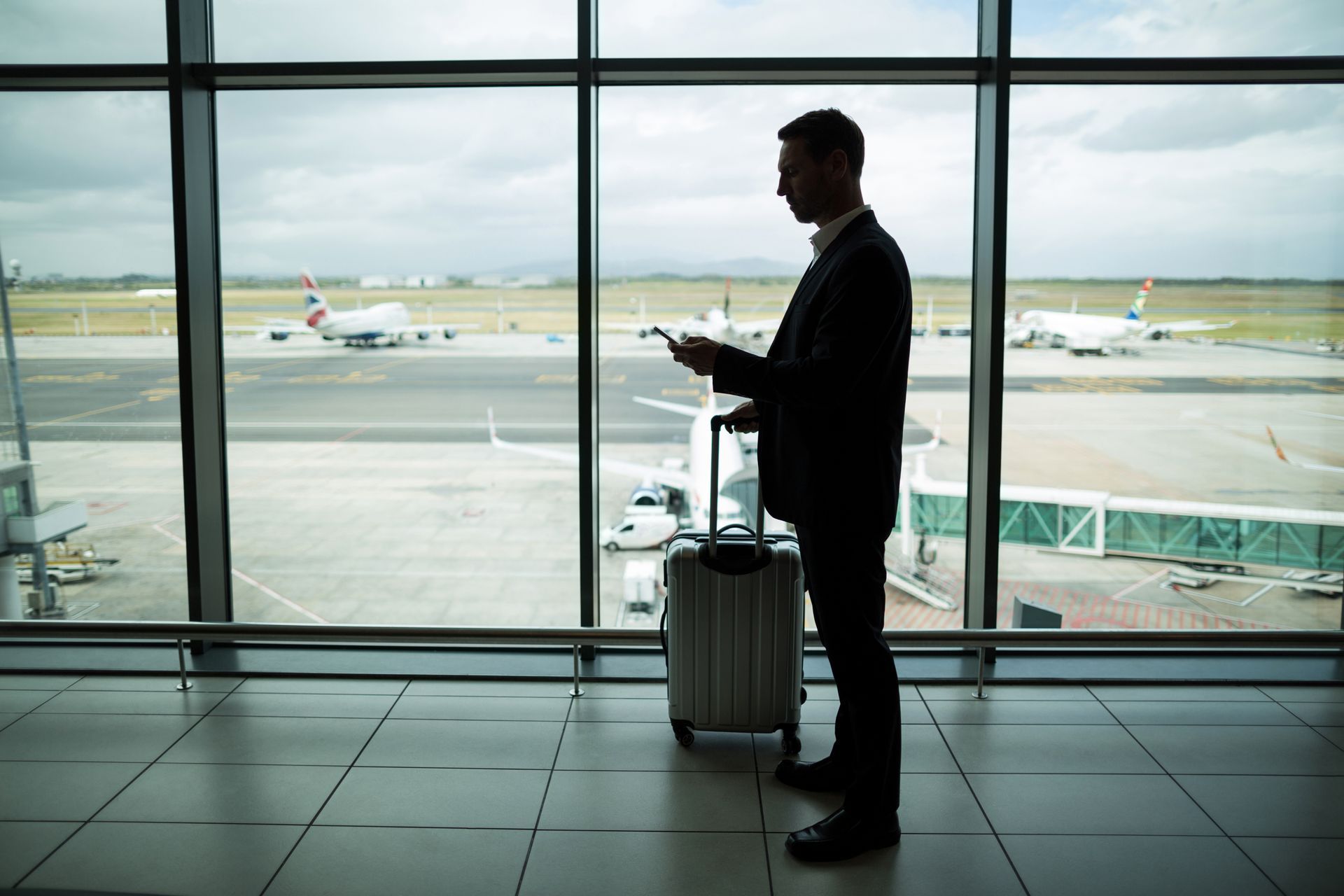- Credit cards
- View all credit cards
- Banking guide
- Loans guide
- Insurance guide
- Personal finance
- View all personal finance
- Small business
- Small business guide
- View all taxes

You’re our first priority. Every time.
We believe everyone should be able to make financial decisions with confidence. And while our site doesn’t feature every company or financial product available on the market, we’re proud that the guidance we offer, the information we provide and the tools we create are objective, independent, straightforward — and free.
So how do we make money? Our partners compensate us. This may influence which products we review and write about (and where those products appear on the site), but it in no way affects our recommendations or advice, which are grounded in thousands of hours of research. Our partners cannot pay us to guarantee favorable reviews of their products or services. Here is a list of our partners .
The Guide to Business Travel Insurance

Many or all of the products on this page are from partners who compensate us when you click to or take an action on their website, but this does not influence our evaluations or ratings. Our opinions are our own.
Table of Contents
What is business travel insurance?
Why should business travelers get a business travel insurance policy, does travel insurance cover business trips, what is business travel accident insurance, do credit cards offer business travel insurance, business travel insurance, recapped.
Imagine the following scenarios. You’re meeting potential clients in their city in the morning, but your checked back, including your suit, didn’t make it. You’re giving a presentation, but some equipment has been stolen out of the hotel conference room. You got food poisoning from a restaurant where you had a business lunch and now require medical attention.
When going on the road for business, the last thing you want is to worry about these types of situations.
Business travel insurance provides coverage for the trips you take as part of your business or for a company that employs you. Knowing that some things don’t always go as planned during travel, you might find yourself benefitting from a business travel insurance policy.
Just like personal trip insurance , business travel insurance covers the unexpected during a business trip. A business travel insurance policy can help get reimbursements for travel expenses caused by trip delay and interruption , baggage delay, business equipment theft, emergency medical care, emergency medical evacuation and collision damage insurance for a rental car.
Depending on how often you travel, it's possible to get an annual insurance plan that will cover multiple trips or insure select travel on a trip-by-trip basis. An annual travel insurance plan is more cost-effective, but it might have lower limits than a single-trip policy.
The short answer is because you can never predict anything. The long answer is that it’s good for the following:
Reducing out-of-pocket expenses: One thing gone wrong, and you’re on the hook for unforeseen travel expenses. For example, medical evacuation can cost tens of thousands of dollars, so it’s important to keep those potential financial losses at bay when possible.
Increasing existing coverage: If you have a personal medical insurance plan, it’s important to note that most private insurance providers don’t provide medical coverage abroad. A credit card with travel protections can be a good start, but these benefits typically offer lower coverage limits.
Providing peace of mind: Having insurance can take some of the anxiety out of traveling. Even if the business trip is going according to plan, you'll know that you have safety nets in place should anything go awry.
» Learn more: How to find the best travel insurance
It depends. Some corporations offer travel insurance plans for their employees on the road. You should double-check with the human resources manager of your company as to whether business trips are covered.
It gets tricky if you’re an independent contractor or a freelancer since you don’t have a corporation behind you. As a sole proprietor, make sure to consult with your insurance provider, but be aware that a personal travel insurance policy might not cover business travel.
Instead, we recommend looking into business travel insurance that will cover your personal trips as well.
For example, the annual AllTrips Executive insurance plan from Allianz covers all trips for the year — personal and business — for a one-time fee. This becomes especially handy when you decide to mix business with pleasure and extend a work trip by adding on a few vacation days.
This policy covers trip emergency medical coverage for up to $50,000 and emergency medical transportation for up to $250,000. Travel delay is covered up to $1,600 and baggage loss or delay is covered up to $1,000 each.
An important feature offered by the AllTrips Executive plan is business equipment coverage. If it’s lost, stolen or delayed by the airline, equipment rental or replacement will be covered up to $1,000 each.
AIG Travel Guard , IMG Global and Zurich all offer business travel insurance, too.
Business travel accident insurance covers you in the event of the unthinkable — death or dismemberment. If it sounds like life insurance, it’s because it provides similar coverage but for when you’re traveling on a common carrier, such as an aircraft, a train, a bus or a cruise ship.
If you or someone in your family holds a life insurance policy for you, business travel accident insurance is going to pay out on top of it.
Some travel rewards credit cards offer travel coverage , but it isn’t always on par with a dedicated business travel insurance plan.
For example, the Ink Business Preferred® Credit Card and the United℠ Business Card offer primary auto rental collision damage waiver on cars rented for business purposes. To receive coverage up to the cash value of the car, you must decline the rental company’s own collision damage insurance and pay for the rental with one of these credit cards.
Note that trip cancellation and trip interruption are covered up to $5,000 with the Ink Business Preferred® Credit Card , but trip delay maxes out at $500. Although the United℠ Business Card comes with the same trip delay coverage limit, trip cancellation and trip interruption top out at up to $1,500 per ticket. Baggage delay is limited to $100 per day under both cards’ coverage.
The Business Platinum Card® from American Express offers the same secondary coverage for trip interruptions and trip cancellations: up to $10,000 per covered trip and $20,000 per eligible card per 12 consecutive month period. For trip delay, the card covers up to $500 per covered trip up to two times per 12 consecutive month period. Terms apply.
Although some insurance coverage offered by your travel rewards credit card is good to have, as you can see above, the coverage limits are typically lower than if you were to buy an annual policy or a single-trip business travel insurance policy.
Credit cards also offer common carrier travel accident insurance and cover costs in case of accidental death and dismemberment. In this case, the first two of the aforementioned cards include coverage for up to $500,000, which is higher than what some annual or single-trip business travel insurance policies usually cover.
» Learn more: The best travel credit cards right now
Business travel accident insurance covers costs accrued in the course of business travel related to medical emergencies, accidental death and dismemberment and emergency evacuations. Specific coverage will vary by insurer.
Given that business travel is typically undertaken with specific business goals in mind and requires companies to take on overhead, travel insurance is likely worth the fraction of trip expenses that it costs to ensure that a company doesn't lose both cash and opportunity at the same time should things not go as planned.
Business travel insurance costs will vary based on the destination, duration of the trip, age of the traveler and the amount of money spent on the trip, among other factors. Some insurers offer annual plans, while others provide coverage on a trip-by-trip basis.
While specific coverage will vary from insurer to insurer, a business travel accident policy typically covers expenses related to medical incidents that occur in the course of the covered business travel.
If you have a personal travel insurance policy, check the terms to see how much applies to business travel. If none, consider purchasing an annual insurance plan for frequent business trips or a single-trip policy for occasional business travel and check with your company to see if the cost of the travel insurance is something you can expense.
Remember that some credit cards offer travel insurance for your business, but note the low payout limits if you choose not to purchase additional coverage.
Insurance Benefit: Trip Cancellation and Interruption Insurance
The maximum benefit amount for Trip Cancellation and Interruption Insurance is $10,000 per Covered Trip and $20,000 per Eligible Card per 12 consecutive month period.
Eligibility and Benefit level varies by Card. Terms, Conditions and Limitations Apply.
Please visit americanexpress.com/benefitsguide for more details.
Underwritten by New Hampshire Insurance Company, an AIG Company.
Insurance Benefit: Trip Delay Insurance
Up to $500 per Covered Trip that is delayed for more than 6 hours; and 2 claims per Eligible Card per 12 consecutive month period.
How to maximize your rewards
You want a travel credit card that prioritizes what’s important to you. Here are some of the best travel credit cards of 2024 :
Flexibility, point transfers and a large bonus: Chase Sapphire Preferred® Card
No annual fee: Wells Fargo Autograph℠ Card
Flat-rate travel rewards: Capital One Venture Rewards Credit Card
Bonus travel rewards and high-end perks: Chase Sapphire Reserve®
Luxury perks: The Platinum Card® from American Express
Business travelers: Ink Business Preferred® Credit Card

on Chase's website
1x-10x Earn 5x total points on flights and 10x total points on hotels and car rentals when you purchase travel through Chase Travel℠ immediately after the first $300 is spent on travel purchases annually. Earn 3x points on other travel and dining & 1 point per $1 spent on all other purchases.
60,000 Earn 60,000 bonus points after you spend $4,000 on purchases in the first 3 months from account opening. That's $900 toward travel when you redeem through Chase Travel℠.

1x-5x 5x on travel purchased through Chase Travel℠, 3x on dining, select streaming services and online groceries, 2x on all other travel purchases, 1x on all other purchases.
60,000 Earn 60,000 bonus points after you spend $4,000 on purchases in the first 3 months from account opening. That's $750 when you redeem through Chase Travel℠.

- Auto Insurance Best Car Insurance Cheapest Car Insurance Compare Car Insurance Quotes Best Car Insurance For Young Drivers Best Auto & Home Bundles Cheapest Cars To Insure
- Home Insurance Best Home Insurance Best Renters Insurance Cheapest Homeowners Insurance Types Of Homeowners Insurance
- Life Insurance Best Life Insurance Best Term Life Insurance Best Senior Life Insurance Best Whole Life Insurance Best No Exam Life Insurance
- Pet Insurance Best Pet Insurance Cheap Pet Insurance Pet Insurance Costs Compare Pet Insurance Quotes
- Travel Insurance Best Travel Insurance Cancel For Any Reason Travel Insurance Best Cruise Travel Insurance Best Senior Travel Insurance
- Health Insurance Best Health Insurance Plans Best Affordable Health Insurance Best Dental Insurance Best Vision Insurance Best Disability Insurance
- Credit Cards Best Credit Cards 2024 Best Balance Transfer Credit Cards Best Rewards Credit Cards Best Cash Back Credit Cards Best Travel Rewards Credit Cards Best 0% APR Credit Cards Best Business Credit Cards Best Credit Cards for Startups Best Credit Cards For Bad Credit Best Cards for Students without Credit
- Credit Card Reviews Chase Sapphire Preferred Wells Fargo Active Cash® Chase Sapphire Reserve Discover It® Cash Back Discover It® Student Chrome Discover It® Student Cash Back Chase Ink Business Unlimited American Express Blue Business Plus
- Credit Card by Issuer Best Chase Cards Best Discover Cards Best American Express Cards Best Visa Credit Cards Best Bank of America Credit Cards
- Credit Score Best Credit Monitoring Services Best Identity Theft Protection
- CDs Best CD Rates Best No Penalty CDs Best Jumbo CD Rates Best 3 Month CD Rates Best 6 Month CD Rates Best 9 Month CD Rates Best 1 Year CD Rates Best 2 Year CD Rates Best 5 Year CD Rates
- Checking Best High-Yield Checking Accounts Best Checking Accounts Best No Fee Checking Accounts Best Teen Checking Accounts Best Student Checking Accounts Best Joint Checking Accounts Best Business Checking Accounts Best Free Checking Accounts
- Savings Best High-Yield Savings Accounts Best Free No-Fee Savings Accounts Simple Savings Calculator Monthly Budget Calculator: 50/30/20
- Mortgages Best Mortgage Lenders Best Online Mortgage Lenders Current Mortgage Rates Best HELOC Rates Best Mortgage Refinance Lenders Best Home Equity Loan Lenders Best VA Mortgage Lenders Mortgage Refinance Rates Mortgage Interest Rate Forecast
- Personal Loans Best Personal Loans Best Debt Consolidation Loans Best Emergency Loans Best Home Improvement Loans Best Bad Credit Loans Best Installment Loans For Bad Credit Best Personal Loans For Fair Credit Best Low Interest Personal Loans
- Student Loans Best Student Loans Best Student Loan Refinance Best Student Loans for Bad or No Credit Best Low-Interest Student Loans
- Business Loans Best Business Loans Best Business Lines of Credit Apply For A Business Loan Business Loan vs. Business Line Of Credit What Is An SBA Loan?
- Investing Best Online Brokers Top 10 Cryptocurrencies Best Low-Risk Investments Best Cheap Stocks To Buy Now Best S&P 500 Index Funds Best Stocks For Beginners How To Make Money From Investing In Stocks
- Retirement Best Roth IRAs Best Gold IRAs Best Investments for a Roth IRA Best Bitcoin IRAs Protecting Your 401(k) In a Recession Types of IRAs Roth vs Traditional IRA How To Open A Roth IRA
- Business Formation Best LLC Services Best Registered Agent Services How To Start An LLC How To Start A Business
- Web Design & Hosting Best Website Builders Best E-commerce Platforms Best Domain Registrar
- HR & Payroll Best Payroll Software Best HR Software Best HRIS Systems Best Recruiting Software Best Applicant Tracking Systems
- Payment Processing Best Credit Card Processing Companies Best POS Systems Best Merchant Services Best Credit Card Readers How To Accept Credit Cards
- More Business Solutions Best VPNs Best VoIP Services Best Project Management Software Best CRM Software Best Accounting Software
- Debt relief Best debt management Best debt settlement Do you need a debt management plan? What is debt settlement? Debt consolidation vs. debt settlement Should you settle your debt or pay in full? How to negotiate a debt settlement on your own
- Debt collection Can a debt collector garnish my bank account or my wages? Can credit card companies garnish your wages? What is the Fair Debt Collection Practices Act?
- Bankruptcy How much does it cost to file for bankruptcy? What is Chapter 7 bankruptcy? What is Chapter 13 bankruptcy? Can medical bankruptcy help with medical bills?
- More payoff strategies Tips to get rid of your debt in a year Don't make these mistakes when climbing out of debt How credit counseling can help you get out of debt What is the debt avalanche method? What is the debt snowball method?
- Manage Topics
- Investigations
- Visual Explainers
- Newsletters
- Abortion news
- Climate Change
- Corrections Policy
- Sports Betting
- Coach Salaries
- College Basketball (M)
- College Basketball (W)
- College Football
- Concacaf Champions Cup
- For The Win
- High School Sports
- H.S. Sports Awards
- Scores + Odds
- Sports Pulse
- Sports Seriously
- Women's Sports
- Youth Sports
- Celebrities
- Entertainment This!
- Celebrity Deaths
- Policing the USA
- Women of the Century
- Problem Solved
- Personal Finance
- Consumer Recalls
- Video Games
- Product Reviews
- Home Internet
- Destinations
- Airline News
- Experience America
- Great American Vacation
- Ingrid Jacques
- Nicole Russell
- Meet the Opinion team
- How to Submit
- Obituaries Obituaries
- Contributor Content Contributor Content
Personal Loans
Best personal loans
Auto Insurance
Best car insurance
Best high-yield savings
CREDIT CARDS
Best credit cards
Advertiser Disclosure
Blueprint is an independent, advertising-supported comparison service focused on helping readers make smarter decisions. We receive compensation from the companies that advertise on Blueprint which may impact how and where products appear on this site. The compensation we receive from advertisers does not influence the recommendations or advice our editorial team provides in our articles or otherwise impact any of the editorial content on Blueprint. Blueprint does not include all companies, products or offers that may be available to you within the market. A list of selected affiliate partners is available here .
Travel insurance
How to find the best business travel insurance
Jennifer Simonson

Kara McGinley
“Verified by an expert” means that this article has been thoroughly reviewed and evaluated for accuracy.
Updated 7:22 a.m. UTC Jan. 18, 2024
- path]:fill-[#49619B]" alt="Facebook" width="18" height="18" viewBox="0 0 18 18" fill="none" xmlns="http://www.w3.org/2000/svg">
- path]:fill-[#202020]" alt="Email" width="19" height="14" viewBox="0 0 19 14" fill="none" xmlns="http://www.w3.org/2000/svg">
Editorial Note: Blueprint may earn a commission from affiliate partner links featured here on our site. This commission does not influence our editors' opinions or evaluations. Please view our full advertiser disclosure policy .

Getty Images
- Business travel insurance can cover trip cancellation, interruption and delay, medical and emergency evacuation, lost baggage and stolen personal belongings.
- Not all travel insurance plans cover work equipment.
- Consider buying business travel insurance if you are self-employed, traveling overseas for business or planning to add leisure time to your business trip.
While business travel insurance might not be the first thing you think of when preparing for a business trip, a comprehensive travel insurance policy can help protect you from financial loss.
Business travel insurance may make sense for you if you are self-employed and footing the bill for your business trip, or if you are traveling internationally and are worried about the cost of medical care abroad. It may also be a smart purchase if your company won’t reimburse you for extra expenses if you experience flight delays or need to cut your trip short because of an emergency back home.
Compare the best travel insurance offers
Travel insured.

Via TravelInsurance.com’s website
Top-scoring plan
Worldwide Trip Protector
Covers COVID?
Medical & evacuation limits per person
$100,000/$1 million

Atlas Journey Preferred
Seven Corners

RoundTrip Basic
$500,000/$1 million
What does business travel insurance cover?
Business travel insurance bundles together several types of coverage, which typically include:
- Trip cancellation insurance.
- Trip interruption insurance.
- Trip delay insurance.
- Travel medical insurance.
- Emergency evacuation insurance.
- Baggage insurance.
- Death and dismemberment insurance.
Coverage types and amounts vary depending on the travel insurance plan you buy.
“Travel insurance may cover trip cancellation, trip interruption, trip delay, medical expense and baggage for both leisure and business,” says Christina Tunnah, spokesperson for World Nomads.
“The specific outcome of a claim, however, depends on the nature of the loss,” she says. “No matter what type of policy you choose, be sure to read the policy in its entirety so you understand any limitations or exclusions.”
Trip cancellation insurance for business trips
Trip cancellation insurance can reimburse you for 100% of the insured cost of your prepaid, nonrefundable travel expenses, such as airline tickets and hotel reservations, should you need to cancel your trip because of a reason listed in your policy.
Reasons that are acceptable for trip cancellation benefits typically include severe weather and injury, serious illness or death of you, your traveling companion or a family member.
Some travel insurance plans, such as AIG Travel’s Travel Guard Deluxe, will allow you to cancel if your business partner is injured, becomes seriously ill or dies. The Deluxe plan also provides trip cancellation benefits for select work reasons, such as unexpected job loss, employer-initiated transfer more than 100 miles from home and being required to stay and work during the scheduled trip.
Trip interruption insurance for business trips
Trip interruption insurance can reimburse up to 150% of your insured trip expenses when you need to end your business trip early for a reason in your policy.
If you have a death in your immediate family and need to return home early, trip interruption benefits could cover the cost of transportation to the airport and a last-minute flight home. It can also reimburse you for nonrefundable expenses like a hotel room that you will no longer need if you cut your trip short.
Trip delay insurance for business trips
If your connecting flight is delayed or canceled, travel delay insurance can cover the cost of unexpected expenses you incur, like a meal at the airport or a night at a hotel.
Trip delay insurance typically has a waiting period before benefits begin, so check your policy to see how many hours the delay must be before you can file a claim. Also, look for the daily and overall maximum benefits per person. If your trip delay insurance only provides $250 in coverage per day, that might not be enough for a taxi and hotel room.
Know more about flight cancellations: Flight cancellations
Travel medical insurance for business trips
When on your business trip, if you get hurt or sick, travel medical insurance can help pay for medical care, imaging tests, lab work, medicine and a hospital stay. This can be particularly valuable if you travel to a country where your U.S. health care plan does not provide coverage.
Emergency evacuation insurance
If you are badly injured or become severely ill in a remote location or underdeveloped country, emergency evacuation travel insurance covers the cost of transporting you to the nearest adequate medical facility for treatment. On some occasions, this coverage pays to fly you home for treatment. It may also include coverage for repatriation of remains if you die on the trip.
Baggage insurance
If your luggage or personal items are lost, damaged or stolen, baggage insurance can cover the depreciated value of your belongings. This is typically secondary insurance, which means you’d have to file a claim with your airline or homeowners insurance first.
Baggage delay coverage can reimburse you for extra expenditures if you are without your bags for a period of time. There is usually a waiting period, such as six or 12 hours before benefits begin. If your bags still haven’t arrived after the waiting period, you can buy replacement items and file a claim for reimbursement. Be sure to note the maximum coverage limit per person as baggage delay coverage might only be a few hundred dollars.
Many travel insurance plans do not include coverage for lost business equipment, so be sure to read your policy for exclusions.
Death and dismemberment insurance
Business travel insurance often includes accidental death and dismemberment insurance. This might cover death or dismemberment that happens while traveling on public transportation, that results from a common carrier accident, that happens in any way except on a common carrier or that occurs at any point during your trip. Read your plan for details.
What to look for in a business travel insurance plan
Business travelers should look for plans that include coverage for rental cars, business equipment, travel delays and trip cancellations.
While most trip cancellation insurance policies cover emergency situations like the death of a family member or severe weather, some policies also cover business-specific cancellations.
The Explorer plan from World Nomads, for example, includes trip cancellation coverage for certain business reasons, such as your company’s acquisition, merger or bankruptcy, physical damage to your company from a natural disaster, vandalism or theft and a requirement to stay by your boss.
If your business trip requires you to travel with equipment, make sure it is covered under your policy.
Allianz offers an annual AllTrips Executive insurance plan that covers both personal and business travel for an entire year. The AllTrips Executive Plan offers benefits for business equipment. If your business equipment is lost, stolen or damaged, Allianz will reimburse reasonable costs for equipment rental, replacement or repair. The policy covers up to $1,000 for replacement or repair and up to $1,000 for business equipment rental, per person, per trip.
Not all insurance plans cover work equipment. Insurance providers like World Nomads exclude coverage for professional equipment. If your bags are stolen, your personal belongings may be covered but your work devices or work-related gear like samples or trade show materials would not be, Tunnah says.
Do you need medical evacuation insurance?
Medical evacuation insurance is a good idea if you are traveling abroad to remote islands or regions of a country that have limited medical facilities or staff, says Scott Adamski, AIG Travel’s Head of Global Product Development.
If this were to happen on your business trip, you might be close enough to get to a local clinic, but it might not be sufficient if the injury sustained requires advanced imaging or emergency surgery. In that case, you would need to be quickly transported to the nearest metropolis.
Having medical evacuation insurance would be critically important because the costs associated with medical evacuations are expensive.
“Even just from the Caribbean to Miami, an air ambulance will come with a five-figure cost, and we have seen many evacuations that land in the six figures. Because payment has to be confirmed before the air ambulance will even take off, travelers need to consider where the funds would come from,” Adamski says.
He adds that while some group health policies offer coverage for evacuations, they may come with a coverage limit of $5,000 to $10,000. In the case of a $100,000 evacuation, you might be responsible for the balance. Facing such a financial burden while trying to get home could be overwhelming. A travel insurance plan with sufficient medical evacuation coverage would be vitally important in a case like this.
Most comprehensive travel plans include coverage for emergency medical transportation, but coverage amounts are typically lower in the more basic plans. If this is important to you, look for a plan with a high coverage limit.
Travel insurance company Travel Guard offers a coverage enhancement called “Medical Bundle” that doubles the coverage limits for medical expenses and evacuation on certain travel insurance products.
Frequently asked questions (FAQs)
Travel insurance covers your financial investment in a trip and extra money you spend because of unforeseen events that happen before and during your trip.
A comprehensive travel insurance plan will include several types of coverage, including trip cancellation , trip delay, trip interruption, emergency medical care, emergency medical evacuation, baggage delay, and loss.
When comparing travel insurance plans, look for what is covered and excluded from coverage, the daily and maximum coverage amounts, and the waiting times before coverage begins.
Travel insurance policies typically exclude routine physicals and dental care, elective medical procedures, mental health care, routine pregnancy, and injuries sustained during high-risk activities such as rock climbing or scuba diving.
If you want coverage for extreme activities, look for a plan that offers an adventure sports upgrade, such as the Travel Guard Deluxe plan.
Business travel insurance can help protect you from unexpected incidents during a work trip such as travel delays or interruptions, lost luggage, and medical emergencies.
It can be smart to buy business travel insurance for a business trip, even if your company is paying for your travel. Here are a few reasons why:
- Your company might not pay for a last-minute, one-way plane ticket if you need to cut your business trip short because of a family emergency back home.
- Your company might not pay your medical bills if you get sick or hurt while on a business trip abroad.
- Your company might not reimburse you if your personal belongings are lost or stolen while on a business trip.
Blueprint is an independent publisher and comparison service, not an investment advisor. The information provided is for educational purposes only and we encourage you to seek personalized advice from qualified professionals regarding specific financial decisions. Past performance is not indicative of future results.
Blueprint has an advertiser disclosure policy . The opinions, analyses, reviews or recommendations expressed in this article are those of the Blueprint editorial staff alone. Blueprint adheres to strict editorial integrity standards. The information is accurate as of the publish date, but always check the provider’s website for the most current information.

Jennifer Simonson covers everything from business to the wine industry to international travel. Outdoor adventure, water parks and all things Texas are by far her favorite beats. Her work has appeared in Forbes, Travel + Leisure, Texas Monthly, Smithsonian Magazine, Fodor's, Lonely Planet, Slate and more. You can follow her on Instagram at @storiestoldwell.
Kara McGinley is deputy editor of insurance at USA TODAY Blueprint and a licensed home insurance expert. Previously, she was a senior editor at Policygenius, where she specialized in homeowners and renters insurance. Her work and insights have been featured in MSN, Lifehacker, Kiplinger, PropertyCasualty360 and more.

10 worst US airports for flight cancellations this week
Travel insurance Heidi Gollub

10 worst US airports for flight cancellations last week

How travel insurance works for baggage
Travel insurance Erica Lamberg

What does travel delay insurance cover?
Travel insurance Mandy Sleight

Travel insurance for UK trips
Travel insurance Amy Fontinelle

What is trip interruption insurance?

What are your rights during an airline meltdown?

Hurricanes and travel insurance

Generali Global Assistance travel insurance review 2024
Travel insurance Jennifer Simonson

Travel insurance for vacations to Italy
Travel insurance Timothy Moore

Tricky travel insurance questions answered by experts

Survey: 20% of Americans have had a life-changing experience while traveling

Our travel insurance ratings methodology

AXA Assistance USA travel insurance review 2024

Cheapest travel insurance of September 2024
MarketWatch Guides is a reviews and recommendations team, independent of the MarketWatch newsroom. We might earn a commission from links in this content. Learn More

The Best Business Travel Insurance (2024 Guide)
with our partner, Faye
Alex Carver is a writer and researcher based in Charlotte, N.C. A contributor to major news websites such as Automoblog and USA Today, she’s written content in sectors such as insurance, warranties, shipping, real estate and more.
Tori Addison is an editor who has worked in the digital marketing industry for over five years. Her experience includes communications and marketing work in the nonprofit, governmental and academic sectors. A journalist by trade, she started her career covering politics and news in New York’s Hudson Valley. Her work included coverage of local and state budgets, federal financial regulations and health care legislation.
Here’s a breakdown of how we reviewed and rated the best travel insurance companies
Travel insurance for business travelers covers specific needs that may differ from personal vacations. For example, you may need an insurance policy to cover a laptop or other business equipment and a rental car. Trip insurance can also provide peace of mind that you have coverage while traveling so you can focus on work.
We at the MarketWatch Guides Team have researched the best travel insurance companies to help you choose the right business travel insurance policy. Read on to learn more about the benefits, coverage options and cost of business travel insurance.

Why Get Business Travel Insurance
Often referred to as corporate travel insurance, business travel insurance can protect you from financial risks and losses during work trips. While personal and business insurance products still offer trip cancellation and medical coverage, there are a few key differences compared to standard travel insurance.
Business travel often includes unique risks due to frequency, trip costs and busy itineraries that require transportation. Frequent business travelers may benefit from multi-trip or annual insurance plans, along with generous coverage limits for trip delays, lost luggage and stolen business devices. These types of trip policies can help combat financial losses related to work travel.
What Business Travelers Need Covered By a Travel Insurance Policy
Below is a list of the main policy types for business trip insurance.
Trip Cancellation and Interruption Coverage
If you need to cancel a business trip or cut it short due to disruptions, travel insurance with trip interruption and cancellation coverage can help recover non-refundable, prepaid costs. Reimbursement is subject to reasons approved by your travel insurance provider and can vary. Generally, travel insurance covers cancellations due to the following unforeseeable events:
- The insured traveler or accompanying business partner suffers a serious illness or injury
- Death of a family member
- Natural disasters
- Terrorist events
- Inclement weather resulting in canceled flights
- An unexpected legal obligation such as jury duty
Since most policies cover cancellations for unexpected or emergent reasons, business travelers may choose to upgrade their plan with cancel for any reason (CFAR) coverage . CFAR coverage is an add-on that allows you more flexibility in canceling your trip.
Baggage and Personal Belongings Coverage
Travel insurance with baggage coverage reimburses partial or full costs due to:
- Lost or damaged baggage
- Theft of valuable business equipment
- Loss of travel documents
Furthermore, most policies provide baggage delay insurance to reimburse you for purchased necessities (like clothes and cosmetics) if your luggage arrives late to your destination.
Business Equipment Coverage
It’s important to check the fine print of policy documents to ensure you have sufficient coverage for specific business equipment. Many providers offer additional business coverage as an upgrade. For example, the Allianz AllTrips Executive Plan features specific benefits for business equipment and rentals.
What Is Business Travel Medical Insurance?
Business travel medical insurance can help cover emergency medical expenses during business trips. While some private health insurance extends international coverage, government health insurance will not pay for your medical care while traveling abroad. Comprehensive travel insurance plans also include emergency medical evacuation and repatriation coverage, along with accidental death and dismemberment benefits.
Travel medical insurance typically pays emergency healthcare costs related to:
- Ambulance service
- Hospital or medical facility fees
- Emergency dental work
- X-rays and lab tests
Business Travel Insurance Cost
The cost of travel insurance depends on your provider, coverage selections and destination. Generally, travel insurance policies cost $35 to $200 per trip. However, your cost may vary if you add business-related coverage such as device protection or rental car damage. You may also have a different rate if you opt for multi-trip or annual coverage .
You can also check with your credit card company to see if you have existing coverage, or opt for coverage through your airline. We suggest requesting quotes from at least three providers before selecting a travel insurance plan.
Benefits of Business Travel Insurance
Whether you’re embarking on a single-trip business venture or you travel for work regularly, it pays to safeguard your travel investments. Business travel insurance costs are minimal in comparison to expensive last-minute cancellations or health emergencies while overseas.
Here are some of the top benefits of a business travel insurance plan:
- Financial protection against unforeseen events
- Reimbursement of prepaid, nonrefundable costs due to travel delays , interruptions and cancellations
- Coverage of lost or stolen business equipment
- Some providers offer 24/7 travel assistance services for business travelers
Tips for Choosing the Right Business Travel Policy
Most comprehensive travel insurance policies are suitable for business travelers. You may choose add-ons for extra protections, including rental car, CFAR and business rental equipment coverage. To choose the right policy, consider the below tips:
- Compare coverage options, exclusions and costs between insurance providers
- Evaluate the reputation and financial stability of each insurance company
- Look for coverage that includes loss or delay of business devices
- Consider providers that offer 24/7 travel assistance and concierge services for business travelers
Considerations for Business Travelers
Before purchasing business travel insurance, consider your personal requirements. For example, you may need coverage for pre-existing medical conditions . If you are traveling abroad, international travel or visa requirements could require valid travel insurance.
If you’re traveling with expensive electronic devices, check that your policy includes valuables or device coverage. Also, consider baggage loss coverage if you plan on checking any valuables with your bags. For regular business travel, consider purchasing multi-trip or annual insurance policies to pay one premium for multiple trips made during a specific time frame.
Is Business Travel Insurance Worth It?
Business trips often include significant prepaid costs for airfares, hotels and car rentals. It is ultimately up to you to decide if travel insurance is worth it for your next business trip. However, travel insurance for business travelers helps cover your financial investment, along with any valuable items you take with you or rent. Comprehensive travel insurance also provides peace of mind in the event of medical emergencies while you’re on business trips overseas.
Frequently Asked Questions About Travel Insurance for Business Travelers
What does business travel accident insurance cover.
Business travel accident insurance protects employees who travel frequently for work. Most policies cover accidental death or dismemberment, which typically applies to incidents that occur on common carriers in transit (like an airplane). However, some plans may include other medical benefits.
Will travel insurance reimburse expenses for a canceled business trip?
Reimbursement rates and conditions depend on your travel insurance policy. If your trip gets canceled for a reason covered by your travel insurance provider, you can claim reimbursement of prepaid, non-refundable costs, such as flights and hotels. Acceptable reasons for cancellation generally include unforeseeable emergencies like serious illness or injury.
Does travel insurance cover business equipment?
Not all travel insurance policies cover business equipment. Check with your provider to ensure you have coverage for specific business items or devices. Many companies offer upgrades and add-ons for extra coverage of valuables, along with plans specifically designed for business travelers.

If you have feedback or questions about this article, please email the MarketWatch Guides team at editors@marketwatchguides. com .

MarketWatch Guides may receive compensation from companies that appear on this page. The compensation may impact how, where and in what order products appear, but it does not influence the recommendations the editorial team provides. Not all companies, products, or offers were reviewed.
Small Business Trends
What is business travel insurance.

Unexpected issues can arise on business trips. If you or your employees regularly travel for meetings, special events, or other business-related tasks, travel insurance may be a worthwhile investment. Read on for a guide about what this type of insurance covers and how it benefits businesses.
What Exactly is Business Travel Insurance?
Business travel insurance is one of the most important types of business insurance for frequent travelers. There are numerous plan types available, so coverage varies. However, it generally covers unexpected issues that arise during trips.
How Does Travel Insurance for Businesses Work?
Corporate travelers often incur unexpected expenses like medical care, evacuation, or lost or damaged belongings. Travel insurance covers many of these costs to keep expenses predictable for businesses. Typically business travel insurance can be purchased when booking a trip or a few weeks before leaving. However, some providers offer annual policies for those who travel frequently.
Why Business Travelers Should Take Out Travel Insurance
Many business travelers incur unexpected costs during trips. Here are some ways travel business insurance benefits users:
- Reduce financial losses: Even just one serious issue that arises during a trip may lead to major expenses for a business. Insurance may reduce the overall costs for a company by avoiding the need to cover things like medical evacuations or lost equipment.
- Keep costs predictable: Though travel insurance for business does increase the cost of each trip, it is paid upfront and at a rate that is easy to budget for. This makes planning business expenses easier throughout the year, rather than waiting for unexpected travel issues to arise.
- Maintain flexibility: Many business travel insurance plans include cancellation coverage. This may allow your business to reschedule trips if something else comes up that is more beneficial.
- Improve travel safety: Many plan details also cover medical care or evacuation. This can improve the health and safety of your team while traveling.
- Provide peace of mind: Even if nothing serious does arise, knowing that you have coverage provided can reduce stress and make business travelers more comfortable.
What is Covered by Small Business Travel Insurance?
Insurance for business travelers can vary by plan and provider. However, there are several main categories that are often included.
Trip Cancellation
Trip cancellations that are made within the allotted time period and for a covered reason may be refunded with this type of coverage. For example, if the event you were traveling for gets canceled, you shouldn’t have to worry about covering the fare.
Medical Care
Medical expenses can really add up, especially during travel. If you or a team member requires emergency medical care or emergency medical evacuation during a trip, this type of coverage should kick in, especially in areas that aren’t covered by traditional medical insurance.
Disruptions
Disruptions like flight cancellations or lost luggage can require extra hotel stays or purchases. Your insurance plan may cover these additional costs, as long as they result from uncontrollable issues like canceled flights.
Business Equipment
If you’re traveling with expensive business equipment, loss or damage may be covered by business traveler’s insurance. For example, if the samples you’re bringing to a trade show are lost by the airline, travel insurance may pay to replace them.

If business travelers need to be evacuated due to an extreme weather event, terror attack, or another uncontrollable issue, many plans cover getting to a safe location.
Read More: how much does business insurance cost
What is Not Covered by a Business Travel Insurance Plan?
Plans vary, but here are common expenses that are generally not included in business traveler’s insurance:
Pre-existing Medical conditions
If a traveler has a known medical condition before the trip, most insurance policies will not cover any complications or medical treatments arising from that condition while traveling.
Known Disasters or Pandemics
If there’s a disaster or pandemic that was known or forecasted before booking the trip, the insurance might not provide coverage. For instance, if a hurricane or viral outbreak was predicted before making travel arrangements, the policy might exclude related cancellations or disruptions.
Missed Flights Due to Personal Errors

If you or your team member misses a flight because of personal mistakes like misreading the flight schedule or arriving late at the airport, the insurance typically will not cover the costs of rebooking or accommodations.
Flights Purchased with Loyalty Points
In most instances, if you’ve booked your travel using frequent flyer miles or loyalty points, the insurance might not reimburse the full monetary value of the ticket. They might, however, offer to reinstate the miles or points.
How Much Does Business Travel Insurance Cost?
The cost of business travel insurance plans varies based on the cost and location of each trip, but many fall around 5 percent of the total trip cost. Certain destinations where medical care or evacuation cost extra may come with added costs, and businesses traveling with expensive equipment may also pay more for policies.
How to Choose the Best Business Trip Travel Insurance

The best business travel insurance varies based on your company’s needs and budget. However, here’s a guide to help you get the most relevant coverage.
- Consider the type of travel: Domestic and international travel come with different concerns. For example, you may be more concerned about medical coverage for international trips if your medical insurance doesn’t cover care overseas.
- Add up the number of business trips: If you take multiple trips each year, consider annual travel insurance to avoid paying separately for each trip.
- Weigh your biggest concerns: If you’re on a tight budget, you may have to choose between coverage for flight delays or lost equipment. Consider what’s most likely to occur or what would cost your company more.
- Look at coverage limits: Policies have maximum limits on what they’ll reimburse for each category. If you travel with expensive equipment, make sure your policy will actually pay the full amount if it is lost or damaged.
- Look for 24-hour assistance services: If your provider has an administrative office that is always available to answer questions, you may be more likely to get the coverage you need quickly.
How to Get Travel Insurance for Your Business

If you’re ready to get insurance coverage for your next business trip, here’s how:
- Book your trip: Most travel insurance is booked for a specific trip. And the cost is calculated based on the arrangements. If you’re looking for annual travel insurance, skip this step.
- Find a provider: Your business insurer may offer travel insurance, so check with them first. Other major travel insurance providers include Allianz Travel Insurance products, Generali Global Assistance, Nationwide, and The Hartford.
- Consider coverage options: These providers may offer different types of plans for various expenses like emergency evacuation or trip interruption, so consider your biggest concerns when selecting a plan.
- Compare quotes: You may also compare providers or plans based on your budget. Tools like TravelInsurance.com make it easy to compare rates.
The Benefits of Business Travel Insurance for Employee Morale
- Boosting Employee Confidence : Business travel insurance can significantly enhance employee morale and confidence. Knowing they are covered in case of emergencies, employees are likely to be more at ease and focused during their business trips.
- Supporting Employee Well-being : Travel insurance that covers medical emergencies, evacuations, or disruptions, shows employees that their well-being is a priority for the company. This can lead to increased loyalty and job satisfaction.
- Encouraging Willingness to Travel : Employees who might be hesitant to travel, especially internationally, may feel more comfortable knowing they have comprehensive insurance coverage. This willingness can open more opportunities for business expansion and networking.
- Stress Reduction : Travel, especially for business purposes, can be stressful. Insurance that covers unexpected situations like flight cancellations, lost luggage, or medical emergencies can significantly reduce this stress, allowing employees to focus on their work objectives.
Aligning Business Travel Insurance with Company Travel Policies
- Integrating Insurance with Travel Policies : For maximum effectiveness, business travel insurance should be an integral part of the company’s overall travel policy. This ensures uniformity in coverage for all employees and adherence to the company’s risk management strategies.
- Customization Based on Travel Patterns : Businesses should customize their travel insurance based on the frequency, nature, and destination of employee travel. For instance, companies with frequent international travel may prioritize policies with extensive medical and evacuation coverage.
- Policy Awareness and Training : Ensuring that employees are aware of the travel insurance policies and understand how to use them is crucial. Regular training sessions can be conducted to inform employees about the procedure to claim insurance and whom to contact in case of emergencies.
- Review and Update Policies Regularly : Travel risks and business needs can change over time. Regularly reviewing and updating the travel insurance policy to align with current risks and travel trends is essential for continued protection and relevance.
The Impact of Business Travel Insurance on Company Finances
- Cost-Benefit Analysis : While business travel insurance comes with a cost, it’s important to conduct a thorough cost-benefit analysis. Compare the potential financial risks of uninsured travel incidents against the insurance premiums to determine if the investment is justified.
- Financial Protection in Emergencies : Insurance can safeguard the company’s finances against significant unexpected expenses during business travel, such as medical emergencies or legal issues.
- Budget Planning and Forecasting : Including travel insurance in the annual budgeting process can aid in better financial forecasting and planning. It provides a clearer picture of the total cost of business travel over a year.
- Long-term Financial Stability : Investing in comprehensive travel insurance can contribute to the long-term financial stability of the company by avoiding sudden financial setbacks due to travel-related incidents.
How Business Travel Insurance Enhances Corporate Responsibility
- Demonstrating Duty of Care : Providing business travel insurance is a tangible demonstration of a company’s duty of care towards its employees. It shows a commitment to safeguarding their well-being while they represent the company.
- Aligning with Corporate Ethics and Values : Companies that prioritize the safety and security of their traveling employees through comprehensive travel insurance align with high standards of corporate ethics and values.
- Building a Responsible Corporate Image : Companies known for taking good care of their employees, especially in situations like business travel, tend to have a positive corporate image. This can be beneficial for brand reputation and employee attraction and retention.
- Fostering a Culture of Safety and Well-being : By integrating business travel insurance into the company’s policies, businesses foster a culture that values safety and well-being. This culture can extend beyond travel to other aspects of the business, contributing to a healthier and more productive work environment.
Does Travel Insurance Cover Going out of Business?
If an airline, accommodation, or tour company goes out of business after you’ve booked with them, the cost may be covered by travel insurance. However, the business must be a covered supplier through your insurance company.
When Should you Buy Business Travel Insurance?
Purchase business travel insurance as soon as possible after booking a trip. This ensures that changes or cancellations are covered — you cannot get reimbursed if you purchase travel insurance after these changes are made. In most cases, buying insurance at least two weeks before a trip is sufficient.
Read More: best small business insurance companies
Image: Depositphotos

© Copyright 2003 - 2024, Small Business Trends LLC. All rights reserved. "Small Business Trends" is a registered trademark.
June 1, 2020
Due to travel restrictions, plans are only available with travel dates on or after
Due to travel restrictions, plans are only available with effective start dates on or after
Ukraine; Belarus; Moldova; North Korea; Russia; Israel
This is a test environment. Please proceed to AllianzTravelInsurance.com and remove all bookmarks or references to this site.

Use this tool to calculate all purchases like ski-lift passes, show tickets, or even rental equipment.

What's the Best Business Travel Insurance?


Share this Page
- {{errorMsgSendSocialEmail}}
Your browser does not support iframes.
Popular Travel Insurance Plans
- Annual Travel Insurance
- Cruise Insurance
- Domestic Travel Insurance
- International Travel Insurance
- Rental Car Insurance
View all of our travel insurance products
Terms, conditions, and exclusions apply. Please see your plan for full details. Benefits/Coverage may vary by state, and sublimits may apply.

Insurance benefits underwritten by BCS Insurance Company (OH, Administrative Office: 2 Mid America Plaza, Suite 200, Oakbrook Terrace, IL 60181), rated “A” (Excellent) by A.M. Best Co., under BCS Form No. 52.201 series or 52.401 series, or Jefferson Insurance Company (NY, Administrative Office: 9950 Mayland Drive, Richmond, VA 23233), rated “A+” (Superior) by A.M. Best Co., under Jefferson Form No. 101-C series or 101-P series, depending on your state of residence and plan chosen. A+ (Superior) and A (Excellent) are the 2nd and 3rd highest, respectively, of A.M. Best's 13 Financial Strength Ratings. Plans only available to U.S. residents and may not be available in all jurisdictions. Allianz Global Assistance and Allianz Travel Insurance are marks of AGA Service Company dba Allianz Global Assistance or its affiliates. Allianz Travel Insurance products are distributed by Allianz Global Assistance, the licensed producer and administrator of these plans and an affiliate of Jefferson Insurance Company. The insured shall not receive any special benefit or advantage due to the affiliation between AGA Service Company and Jefferson Insurance Company. Plans include insurance benefits and assistance services. Any Non-Insurance Assistance services purchased are provided through AGA Service Company. Except as expressly provided under your plan, you are responsible for charges you incur from third parties. Contact AGA Service Company at 800-284-8300 or 9950 Mayland Drive, Richmond, VA 23233 or [email protected] .
Return To Log In
Your session has expired. We are redirecting you to our sign-in page.
What is business travel insurance?
Advertiser disclosure.
We are an independent, advertising-supported comparison service. Our goal is to help you make smarter financial decisions by providing you with interactive tools and financial calculators, publishing original and objective content, by enabling you to conduct research and compare information for free - so that you can make financial decisions with confidence.
Bankrate has partnerships with issuers including, but not limited to, American Express, Bank of America, Capital One, Chase, Citi and Discover.
- Share this article on Facebook Facebook
- Share this article on Twitter Twitter
- Share this article on LinkedIn LinkedIn
- Share this article via email Email

- • Personal finance
- • Mortgages
- • Credit cards
- • Rewards credit cards
The Bankrate promise
At Bankrate we strive to help you make smarter financial decisions. While we adhere to strict editorial integrity , this post may contain references to products from our partners. Here's an explanation for how we make money . The content on this page is accurate as of the posting date; however, some of the offers mentioned may have expired. Terms apply to the offers listed on this page. Any opinions, analyses, reviews or recommendations expressed in this article are those of the author’s alone, and have not been reviewed, approved or otherwise endorsed by any card issuer.
At Bankrate, we have a mission to demystify the credit cards industry — regardless or where you are in your journey — and make it one you can navigate with confidence. Our team is full of a diverse range of experts from credit card pros to data analysts and, most importantly, people who shop for credit cards just like you. With this combination of expertise and perspectives, we keep close tabs on the credit card industry year-round to:
- Meet you wherever you are in your credit card journey to guide your information search and help you understand your options.
- Consistently provide up-to-date, reliable market information so you're well-equipped to make confident decisions.
- Reduce industry jargon so you get the clearest form of information possible, so you can make the right decision for you.
At Bankrate, we focus on the points consumers care about most: rewards, welcome offers and bonuses, APR, and overall customer experience. Any issuers discussed on our site are vetted based on the value they provide to consumers at each of these levels. At each step of the way, we fact-check ourselves to prioritize accuracy so we can continue to be here for your every next.
Editorial integrity
Bankrate follows a strict editorial policy , so you can trust that we’re putting your interests first. Our award-winning editors and reporters create honest and accurate content to help you make the right financial decisions.
Key Principles
We value your trust. Our mission is to provide readers with accurate and unbiased information, and we have editorial standards in place to ensure that happens. Our editors and reporters thoroughly fact-check editorial content to ensure the information you’re reading is accurate. We maintain a firewall between our advertisers and our editorial team. Our editorial team does not receive direct compensation from our advertisers.
Editorial Independence
Bankrate’s editorial team writes on behalf of YOU – the reader. Our goal is to give you the best advice to help you make smart personal finance decisions. We follow strict guidelines to ensure that our editorial content is not influenced by advertisers. Our editorial team receives no direct compensation from advertisers, and our content is thoroughly fact-checked to ensure accuracy. So, whether you’re reading an article or a review, you can trust that you’re getting credible and dependable information.
How we make money
You have money questions. Bankrate has answers. Our experts have been helping you master your money for over four decades. We continually strive to provide consumers with the expert advice and tools needed to succeed throughout life’s financial journey.
Bankrate follows a strict editorial policy , so you can trust that our content is honest and accurate. Our award-winning editors and reporters create honest and accurate content to help you make the right financial decisions. The content created by our editorial staff is objective, factual, and not influenced by our advertisers.
We’re transparent about how we are able to bring quality content, competitive rates, and useful tools to you by explaining how we make money.
Bankrate.com is an independent, advertising-supported publisher and comparison service. We are compensated in exchange for placement of sponsored products and services, or by you clicking on certain links posted on our site. Therefore, this compensation may impact how, where and in what order products appear within listing categories, except where prohibited by law for our mortgage, home equity and other home lending products. Other factors, such as our own proprietary website rules and whether a product is offered in your area or at your self-selected credit score range, can also impact how and where products appear on this site. While we strive to provide a wide range of offers, Bankrate does not include information about every financial or credit product or service.
Key takeaways
- Business travel insurance reimburses particular unexpected expenses or financial losses you suffer before or during a trip for work.
- A travel insurance policy usually covers things like trip cancellation/interruption, medical costs, lost baggage, travel delays, lodging expenses and more.
- Costs for business travel insurance often run between 5 and 7 percent of the trip's total expense.
- If you have a business travel credit card, however, you likely already have at least basic travel insurance under its policy, so you might not need to purchase any additional coverage.
A lot can go wrong before or during a faraway meeting, out-of-state conference, remote office visit or other planned business trip. The airport can lose or damage your luggage, your travel plans may need to be canceled suddenly due to a personal emergency or you could simply get sick while away from home.
For these reasons and more, it’s smart to consider getting business travel insurance . This coverage should safeguard you financially if you incur a covered setback prior to or while you’re traveling for work .
This guide will answer what is business travel insurance, how does it work and what’s covered, as well as who should get business travel insurance and whether it’s worth it.
How does business travel insurance work?
You have insurance for your home, car and health care. You might even have life insurance coverage. But where do you turn if you want to protect yourself financially from a business trip setback? Fortunately, you can purchase business travel insurance, also called corporate travel insurance or business trip insurance.
“Business travel insurance is insurance coverage specifically designed to protect individuals traveling for a business-specific reason. It offers comprehensive protection against unexpected incidents and expenses that can occur during a business trip,” explains Mark Friedlander, director of Corporate Communications for the Insurance Information Institute in St. Johns, Florida.
Consider that many expenses related to an upcoming business trek must be paid well in advance and are not refundable. That means if something happens that prevents you from traveling, you could be on the hook for hundreds, if not thousands, of dollars. That’s where having business travel insurance comes in handy.
“You can purchase a single-trip policy, which covers expenses that arise on a single trip — usually between travel dates specified in advance,” Andrew Schrage, CEO of Money Crashers in Boston, notes. “Or, you can choose an annual or multi-trip policy that covers any eligible expenses that arise during the policy’s effective period — usually one year — regardless of how many trips you take during that time.”
What does business travel insurance cover?
Here’s what a standard business travel insurance policy typically covers, per Friedlander:
- Trip cancellation/interruption costs
- Expenses related to travel delays
- Medical bills incurred while traveling
- Missed connection assistance expenditures
- Costs and hassles related to lost baggage
- Car rental and lodging expenses
Stan Sandberg, co-founder of TravelInsurance.com, says many consumers opt for business trip insurance for the trip cancellation/interruption protections offered.
“Standard trip cancellation coverage will reimburse non-refundable, prepaid costs if an insured traveler has to cancel for a wide range of reasons, including getting sick unexpectedly.” — Stan Sandberg, co-founder of TravelInsurance.com
Coverage for medical emergencies and health care away from home are other popular standard features in most plans.
“This is especially valuable for employees traveling abroad, where regular medical insurance might not apply. And individuals with chronic conditions can find coverage for flare-ups during travel by declaring them before the business trip,” says Justin Albertynas, a travel industry expert.
A business travel insurance policy doesn’t cover every possible expense, however. Among the typical exclusions are:
- Reasonably foreseen events
- Acts of war
- Declared epidemics and pandemics (by the World Health Organization and/or U.S. Centers for Disease Control and Prevention)
- Travel restrictions imposed by a government entity
Who should get business travel insurance?
Good candidates for purchasing business travel insurance include those who frequently travel for work but are not already covered by their employer.
“As most large employers most likely have travel insurance plans in place to cover their employees’ work-related travel, individual business travel insurance plans are typically targeted to independent contractors and small business owners,” adds Friedlander.
Examples of business travel insurance in action
Here are three hypothetical scenarios that underscore the value of having business trip insurance:
1. You need to cancel your trip last minute
“Let’s say you have a single-trip business travel policy with trip cancellation/interruption coverage that reimburses up to $5,000 in prepaid, non-refundable expenses,” Schrage explains. “The day before your flight, an immediate family member has a medical emergency, and you need to cancel your trip to care for them. If you paid $500 for round-trip airfare, $1,000 for a five-day hotel stay, and $300 for a five-day car rental, your insurer should honor a claim for $1,800 total, as long as the expenses are fully paid and not refundable by the vendor under any circumstances.”
2. You get into a medical emergency
“Imagine an employee traveling for business in Germany who unexpectedly falls ill and requires medical attention,” Albertynas says. “The incurred expenses may include a doctor’s consultation, prescription medications, hospital stay and necessary medical tests. In this scenario, the employee’s total medical expenses could add up to €1,950 or more. Business travel insurance could cover these costs, ensuring that the employee is not burdened by unexpected medical bills during their trip.”
3. Your baggage is delayed
Assume your suitcase gets lost or delayed by the airline, and you need to pay extra money out of pocket for clothing, medicine and toiletries. Your policy should cover your expenses up to a predetermined amount. “Just keep in mind that business travel insurance policies often have a waiting period before coverage begins for baggage delays — typically around 12 hours,” Albertynas continues.
The average cost of business travel insurance
Business trip insurance policies commonly run approximately 5 percent to 7 percent of the total cost of your trip. “For example, travel insurance for a $3,000 business trip would cost between $150 and $180 in premium for the policy,” Friedlander says.
What you will pay depends on the type of policy, your destination, coverage inclusions, your age and other factors. Schrage adds, “Basic trip interruption/cancellation coverage can cost as little as $10 to $20 per day, while more comprehensive policies can cost $50 or more per day. Policies that cover voluntary cancellations, known as CFAR policies, cost 50 percent to 100 percent more than policies that cover involuntary cancellations only.”
Choosing a higher deductible can lower your premium, but you’ll pay more upfront if you have to make a claim .
“Opting for a $200 deductible, for example, means you will pay that amount before coverage starts. Co-pays, co-insurance and out-of-pocket expenses refer to costs beyond the coverage limits,” Albertynas says. “It’s important to carefully review all policy details and premium quotes and understand the trade-offs involved so you can select the right plan while balancing your premium, deductible and additional expenses.”
Do credit cards offer business travel insurance?
Getting trip insurance is almost always a smart idea. But the truth is, it might be an unnecessary expense if you already have free coverage included with your credit card , which some cards provide.
“Many business credit cards provide generous business travel coverage at no out-of-pocket cost. As long as you use your credit card to pay for eligible travel expenses, this is a better deal than buying a policy separately.” — Andrew Schrage, CEO of Money Crashers in Boston
The most common types of coverage included in business travel insurance provided by a credit card are trip interruption/cancellation, accidental death and dismemberment, and rental car loss/damage.
“Before assuming your trip is covered in full, look at the limits for each coverage type and do the math. For example, if the non-refundable portion of the trip costs $10,000 and your policy only provides $5,000 in interruption/cancellation coverage, you’ll pay at least $5,000 out-of-pocket,” Schrage cautions.
The bottom line
Acquiring business travel insurance is worth it if you frequently travel for work — especially if you spend a lot on business trips, travel abroad or to riskier countries and don’t already have coverage provided by your employer or a travel credit card .
“But all business travel policies are not the same,” adds Friedlander. “It’s wise to read the fine print of your policy so you have a clear understanding of what’s covered and what’s excluded.”
Related Articles

Landlord Insurance: What It Is and Who Needs It

How issuers define travel: What’s considered a travel purchase?
What Is Earthquake Insurance?

What is a business credit card and how do they work?
Service unavailable in your location
Unfortunately Booking.com for Business is currently not offering its services in your location
Get in touch
801-224-5300

The importance of business travel insurance
When sending employees on business trips , not only are you investing in your company's growth and success, but you're also responsible for their well-being during travel. To protect both your employees and your business from unforeseen risks, having business travel insurance is essential. In this article, we'll discuss the importance of business travel insurance, how to choose the right policy, and tips for staying safe while traveling for work.
1. What is Business Travel Insurance and What Does It Cover?
Business travel insurance is a specialized type of insurance that covers employees while traveling for work-related purposes. It typically provides coverage for a range of potential risks, including:
- Medical emergencies: Covers healthcare costs for employees who become ill or injured while traveling
- Trip cancellations and delays: Reimburses for non-refundable expenses if a trip is canceled or delayed due to unforeseen circumstances
- Lost or delayed baggage: Provides compensation for lost, damaged, or delayed luggage during transit
- Personal liability: Covers legal expenses if an employee causes injury or property damage while traveling
- Travel assistance: Provides 24/7 support for travel-related issues, such as passport replacement or emergency cash transfers
2. The Risks Associated with Business Travel
Although business travel can be exciting and rewarding, it also presents various risks that employees may face, such as:
- Illness or injury: Contracting an illness or experiencing an injury in a foreign country can be both challenging and expensive.
- Travel disruptions: Unexpected events like natural disasters, terrorism, or political instability can disrupt travel plans and cause financial losses.
- Lost or stolen valuables: Travelers face a heightened risk of losing essential items like passports, laptops, or other valuables.
- Legal issues: Employees may inadvertently violate local laws or become involved in disputes, potentially resulting in legal expenses.
3. How to Choose the Right Business Travel Insurance Policy
To ensure that your employees have the appropriate coverage while traveling for work, consider the following when selecting a business travel insurance policy:
- Assess the risks: Evaluate the destinations your employees will visit and the potential risks associated with that region, including political stability, healthcare quality, and common travel disruptions.
- Review coverage limits: Choose a policy with appropriate coverage limits to ensure adequate protection for medical expenses, lost baggage, and other potential costs.
- Compare policies: Compare policies from multiple insurance providers to find the best combination of coverage, price, and service quality.
- Examine exclusions: Be sure to understand any policy exclusions, such as pre-existing medical conditions, so you can make an informed decision and avoid any surprises during a claim.
4. What to Do If You Need to Make a Claim
If an employee experiences an incident covered by their business travel insurance, it's crucial to follow the correct procedure for filing a claim:
- Contact your insurance provider: Notify your insurance company as soon as possible and provide them with details about the incident.
- Collect documentation: Gather any necessary documentation to support your claim, such as receipts, medical reports, or police reports.
- Submit your claim: Complete any required claim forms and submit them, along with supporting documentation, to your insurance provider.
- Follow up: Monitor the progress of your claim and provide any additional information if requested.
5. Tips for Staying Safe While Traveling for Work
To promote safety and minimize risks while traveling for business, consider these practical tips:
- Research your destination: Familiarize yourself with local customs, laws, and safety concerns before departure.
- Register with your embassy: Enroll in your country's embassy or consulate abroad to receive updates and assistance in an emergency.
- Keep essential documents secure: Carry photocopies of important documents and store digital copies in a secure location.
- Maintain communication: Ensure employees have a way to contact their office or family in an emergency, such as a cell phone or internet access.
6. Common Myths About Business Travel Insurance
Some common misconceptions about business travel insurance include:
- "My employees are already covered by their personal travel insurance." Personal travel insurance may not cover work-related incidents, making it essential to have separate business coverage.
- "Business travel insurance is too expensive." The cost of a comprehensive policy is often minimal compared to the financial risks associated with business travel.
In conclusion, business travel insurance is a necessary investment for companies to safeguard the well-being of their employees and protect the business from potential risks. By choosing the right policy and following safety tips, you can ensure a successful and secure business trip.
Need help planning your next business trip with the right insurance coverage in place? Contact CTI Business Travel today to discuss your requirements and receive expert advice on protecting your employees and your business while on the road.

How to Maximize Employee Satisfaction in Business Travel

Top Travel Trends to Watch in the Corporate World

Navigating International Business Travel: Tips and Expectations

The Advantages of Personalized Travel Services for Executives

Sustainable Business Travel: Best Practices and Tips

Ensuring Travel Security and Safety in a Post-Pandemic World

Cost Saving Strategies for Your Business Travel Needs

How Travel Software and Apps are Revolutionizing Corporate Travel

Exploring the World of Speciality Travel with CTI Business Travel

Your Guide to Flawless Meeting and Corporate Event Planning
Main Office Number: 801-224-5300
Corporate Office: 800-800-6819
Sales: 801-874-9056
Privacy Policy Referrals
© 2022. All Rights Reserved. CTI Business Travel . Powered By OneLocal

What is business travel insurance?
Key takeaways.
- Business travel insurance reimburses particular unexpected expenses or financial losses you suffer before or during a trip for work.
- A travel insurance policy usually covers things like trip cancellation/interruption, medical costs, lost baggage, travel delays, lodging expenses and more.
- Costs for business travel insurance often run between 5 and 7 percent of the trip's total expense.
- If you have a business travel credit card, however, you likely already have at least basic travel insurance under its policy, so you might not need to purchase any additional coverage.
A lot can go wrong before or during a faraway meeting, out-of-state conference, remote office visit or other planned business trip. The airport can lose or damage your luggage, your travel plans may need to be canceled suddenly due to a personal emergency, or you could simply get sick while away from home.
For these and other reasons and more, it’s smart to consider getting business travel insurance . This coverage should safeguard you financially if you incur a covered setback prior to or while you’re traveling for work .
This guide will help you find out more about business travel insurance, how it works and what’s covered, as well as who should get business travel insurance and whether this level of coverage is worth it.
How does business travel insurance work?
You have insurance for your home, car and health care. You might even have life insurance coverage. But where do you turn if you want to protect yourself financially from a business trip setback? Fortunately, you can purchase business travel insurance, also called corporate travel insurance or business trip insurance.
“Business travel insurance is insurance coverage specifically designed to protect individuals traveling for a business-specific reason. It offers comprehensive protection against unexpected incidents and expenses that can occur during a business trip,” explains Mark Friedlander, director of Corporate Communications for the Insurance Information Institute in St. Johns, Florida.
Consider that many expenses related to an upcoming business trek have to be paid well in advance and are not refundable. That means if something happens that prevents you from traveling, you could be on the hook for hundreds if not thousands of dollars. That’s where having business travel insurance comes in handy.
“You can purchase a single-trip policy, which covers expenses that arise on a single trip — usually between travel dates specified in advance,” Andrew Schrage, CEO of Money Crashers in Boston, notes. “Or, you can choose an annual or multi-trip policy that covers any eligible expenses that arise during the policy’s effective period — usually one year — regardless of how many trips you take during that time.”
What does business travel insurance cover?
Here’s what a standard business travel insurance policy typically covers, per Friedlander:
- Trip cancellation/interruption costs
- Expenses related to travel delays
- Medical bills incurred while traveling, including those related to COVID-19
- Missed connection assistance expenditures
- Costs and hassles related to lost baggage
- Car rental and lodging expenses
Stan Sandberg, co-founder of TravelInsurance.com, says many consumers opt for business trip insurance for the trip cancellation/interruption protections offered.
“Standard trip cancellation coverage will reimburse non-refundable, prepaid costs if an insured traveler has to cancel for a wide range of reasons, including getting sick unexpectedly,” he says.
Coverage for medical emergencies and health care away from home are other popular standard features in most plans.
“This is especially valuable for employees traveling abroad, where regular medical insurance might not apply. And individuals with chronic conditions can find coverage for flare ups during travel by declaring them before the business trip,” says Justin Albertynas, a travel industry expert and CEO of RatePunk.
A business travel insurance policy doesn’t cover every possible expense, however. Among the typical exclusions are:
- Reasonably foreseen events
- Acts of war
- Declared epidemics and pandemics (by the World Health Organization and/or U.S. Centers for Disease Control and Prevention)
- Travel restrictions imposed by a government entity.
Who should get business travel insurance?
Good candidates for purchasing business travel insurance include those who frequently travel for work but are not already covered by their employer.
“As most large employers most likely have travel insurance plans in place to cover their employees’ work-related travel, individual business travel insurance plans are typically targeted to independent contractors and small business owners,” adds Friedlander.
Examples of business travel insurance in action
Here are three hypothetical scenarios that underscore the value of having business trip insurance:
1. You need to cancel your trip last minute
“Let’s say you have a single-trip business travel policy with trip cancellation/interruption coverage that reimburses up to $5,000 in prepaid non-refundable expenses,” Schrage explains. “The day before your flight, an immediate family member has a medical emergency and you need to cancel your trip to care for them. If you paid $500 for round-trip airfare, $1,000 for a five-day hotel stay, and $300 for a five-day car rental, your insurer should honor a claim for $1,800 total, as long as the expenses are fully paid and not refundable by the vendor under any circumstances.”
2. You get into a medical emergency
“Imagine an employee traveling for business in Germany who unexpectedly falls ill and requires medical attention,” Albertynas says. “The incurred expenses may include a doctor’s consultation, prescription medications, hospital stay and necessary medical tests. In this scenario, the employee’s total medical expenses could add up to €1,950 or more. Business travel insurance could cover these costs, ensuring that the employee is not burdened by unexpected medical bills during their trip.”
3. Your baggage is delayed
Assume your suitcase gets lost or delayed by the airline and you need to pay extra money out of pocket for clothing, medicine and toiletries. Your policy should cover your expenses up to a predetermined amount. “Just keep in mind that business travel insurance policies often have a waiting period before coverage begins for baggage delays — typically around 12 hours,” Albertynas continues.
The average cost of business travel insurance
Business trip insurance policies commonly run approximately 5 percent to 7 percent of the total cost of your trip. “For example, travel insurance for a $3,000 business trip would cost between $150 and $180 in premium for the policy,” Friedlander says.
What you will pay will depend on the type of policy, your destination, coverage inclusions, your age and other factors. Schrage adds, “Basic trip interruption/cancellation coverage can cost as little as $10 to $20 per day, while more comprehensive policies can cost $50 or more per day. Policies that cover voluntary cancellations, known as CFAR policies, cost 50 percent to 100 percent more than policies that cover involuntary cancellations only.”
Choosing a higher deductible can lower your premium, but you’ll pay more upfront if you have to make a claim.
“Opting for a $200 deductible, for example, means you will pay that amount before coverage starts. Co-pays, co-insurance and out-of-pocket expenses refer to costs beyond the coverage limits,” Albertynas says. “It’s important to carefully review all policy details and premium quotes and understand the trade-offs involved so you can select the right plan while balancing your premium, deductible and additional expenses.”
Do credit cards offer business travel insurance?
Getting trip insurance is almost always a smart idea. But the truth is, it might be an unnecessary expense if you already have free coverage included with your credit card , which some cards provide.
“Many business credit cards provide generous business travel coverage at no out-of-pocket cost. As long as you use your credit card to pay for eligible travel expenses, this is a better deal than buying a policy separately,” advises Schrage.
The most common types of coverage included in business travel insurance provided by a credit card are trip interruption/cancellation, accidental death and dismemberment, and rental car loss/damage.
“Before assuming your trip is covered in full, look at the limits for each coverage type and do the math. For example, if the non-refundable portion of the trip costs $10,000 and your policy only provides $5,000 in interruption/cancellation coverage, you’ll pay at least $5,000 out-of-pocket,” Schrage cautions.
The bottom line
Acquiring business travel insurance is worth it if you frequently travel for work — especially if you spend a lot on business trips, travel abroad or to riskier countries and don’t already have coverage provided by your employer or a travel credit card .
“But all business travel policies are not the same,” adds Friedlander. “It’s wise to read the fine print of your policy so you have a clear understanding of what’s covered and what’s excluded.”


- Single Trip
- Annual Multi-Trip
- Winter Sports & Ski
- Sport & Leisure
- Medical Conditions
- Travel Insurance for Non-UK Residents
Group Travel Insurance
- Travel Insurance for Couples
- Covid-19 travel insurance
- Holiday Cancellation Insurance
- Emergency Medical Assistance Cover
- Emergency Medical Cover for Travel Insurance
- Repatriation Insurance
- Baggage Cover
- Comprehensive
- What's Covered
- Excluded Vehicles
- Range Rover
- Car Hire Excess Insurance
- Policy Information
- File a Claim
- Insurance Glossary
- Coronavirus - Annual Multi-trip Policy
- partner-hub

Business Travel Insurance

What is business travel insurance?
If you’re planning a business trip, you should make sure you’re protected in case something doesn’t go to plan. With our business travel insurance policies, you can choose the perfect cover for you. Whether you're travelling once or taking multiple trips, heading to Europe or visiting further afield, our business travel insurance is appropriate for most travellers.
By purchasing travel insurance for your business trip, you can take the unnecessary worry out of travelling, so you can concentrate on the job at hand. Our specialist business travel insurance is designed with professionals in mind. That’s why we include cover for business equipment, alongside medical expenses, loss and cancellation. This way, you can rest assured that should anything unexpected happen, the essentials will be taken care of.
As with our usual policies, you can feel safe in the knowledge that our global team of experts are on hand to provide support and assistance if something goes wrong. With over 13,000 people working across five continents and speaking 58 languages, we’ll be by your side wherever your work takes you.
Below is some more information about our insurance products, for which Terms and Conditions apply. Please visit the policy information hub for full details.
What does business travel insurance cover?
With our business travel insurance, you can choose between a Single Trip or Annual policy. We also have two levels of cover: Silver and Gold.
Whichever level of cover you choose, our Single Trip and Annual policies include business equipment cover, so you may not need to take out separate laptop travel insurance. We can even send a replacement business associate to complete your itinerary if you have to cut your journey short.
Business travel insurance can protect you if you need to cancel your trip before you travel, or if you need to curtail your journey. If your departure or your personal belongings are delayed, we can provide some compensation. We’ll even provide legal support to claim compensation for a fatality, or if you fall ill or are injured on your trip.
We also understand that medical cover is important. That’s why our travel insurance for business trips covers emergency medical expenses, personal accident and personal liability cover. You’ll have 24-hour access to a GP consultation service too.
To help protect you while you’re away, our policies can cover you if you lose your passport, personal money or personal possessions. If you choose our Gold cover, you’ll also be protected against the financial failure of your end-supplier.
To see exactly what our business travel insurance policies include, please visit the Policy Information Hub .
The right cover to fit your needs for you and your travels
Swipe to view more
Business Silver
Business gold, annual multi-trip silver with business, frequently asked questions.
Whether our Single Trip or Annual business travel insurance is right for you will likely depend on how often you travel.
If you’re only planning on taking one business trip this year, then our Single Trip business travel insurance is the right insurance policy for you. But, if you’re a frequent traveller and you plan on taking multiple trips, our Annual business travel insurance could work out to be a more cost-effective option.
You can work out whether a Single Trip policy or an Annual policy is best suited to your needs by getting a business travel insurance quote online.
If you’re thinking of combining business with pleasure on your trip, while many sports and leisure activities are covered as standard on our Business Travel policies, from 5th May 2021, we will not be able to provide cover while you take part in riskier Category 3 and Category 3 sports and leisure activities like kite surfing and rubgy. This is only a temporary measure while we make improvements to the booking engine of our website. Please keep an eye on the Allianz Assistance website in the future so you are aware when we are able to offer this additional cover again. Policies purchased after 5th May 2021 aren't affected and your cover won't change.
If you’re likely to hit the slopes while you’re away, then we do offer Winter Sports and Ski as an optional addition to your policy. This will provide you with protection against ski-specific risks such as avalanche closures, delayed or damaged ski equipment and unused ski-pack costs.
How to ensure you have the right cover
Does your bank or credit card company provide cover.
Many bank accounts and credit cards come with some level of travel insurance cover. While some may be comprehensive, they may not cover you for everything you have planned whilst you’re away, particularly if you have adventurous plans or unusual excursions booked.
Make sure you look into the travel insurance policy that you have before every trip, to make sure it’s suitable for you and your plans.
Purchasing a holiday using a credit card means you are often protected by Consumer Protection cover. In most cases, it allows you to get your money returned to you if your provider defaults and you cannot travel.
Are you covered by ABTA or ATOL?
If you have booked a holiday through a tour operator or travel agent, it may be worth checking if you are covered by ABTA (Association of British Travel Agents) or ATOL (Air Travel Organiser’s License). This type of cover means that your package holiday is protected if, for example, the travel company providing your holiday arrangements or the travel agent themselves fail financially or close down.
Your travel agents will be able to tell you if your holiday is ABTA or ATOL protected. Alternatively, use the links provided to check your cover at home.
What is an EHIC or GHIC and what can it offer you?
Get peace of mind – whether travelling for work or play – with our additional cover options.

Annual Multi-Trip Travel Insurance

Single Trip Travel Insurance

Golf Travel Insurance

Sports & Leisure Insurance

Travel Insurance for Europe

Travel Insurance for people with Medical Conditions
Get peace of mind – whether travelling for work or play – with our additional cover options .
Other products you may like

Need help? Call us on: 0371 200 0428
Make a claim, policy documents.
If you have a pre-existing medical condition that we are unable cover under our own policies, you may be able to obtain an alternative travel insurance policy through one of the providers featured in the MoneyHelper directory of specialist travel insurance providers for people with serious medical conditions. Do take time to study and compare the terms and conditions to ensure you have the cover you need. To contact the Money Advice Service for further details of the directory
Call: 0800 138 7777 (lines are open Monday to Friday, 8am to 6pm) or Email: [email protected]
- Learn & Grow
- Life Events
- Money Management
- More Than Money
- Privacy & Security
- Business Resources
International travel insurance: What it is and how it works
September 17, 2024 | 4 min read
Travel insurance can be a financial safety net for any trip, whether you’re crossing state lines or international borders. But it might be more important for an international trip, when your plans can come with a bigger price tag.
So whether you’re planning the bucket-list adventure of a lifetime or a spontaneous birthday blowout, learn more about international travel insurance and the potential benefits it can offer.
What you’ll learn:
International travel insurance can offer peace of mind and financial assistance should the unexpected disrupt your trip.
Some of the most common types of international travel insurance are trip cancellation and health or medical insurance.
The right insurance for you depends on many factors, including where you’re going, your health, your existing coverage and the level of risk you’re comfortable with.
Travel insurance is available through some credit cards, including Venture X from Capital One.
Where will Venture X take you?
Why do you need international travel insurance.
There are lots of reasons why you might want to buy travel insurance. Common ones are peace of mind and financial protection should something go wrong before or during a trip.
Some examples of situations where international travel insurance can help include:
- Compensation for cutting short or canceling a trip because of illness or injury
Reimbursement for flight-delay expenses
Coverage for medical assistance for sickness or injury
Coverage for legal assistance after an accident
How does international travel insurance work?
You can buy travel insurance through insurance companies and brokers, travel agents, travel reservation sites, airlines or cruise lines. Some travel credit cards come with certain travel insurance protections , so it’s a good idea to check what yours covers.
Types of international travel insurance
Some of the most common types of international travel insurance include:
Trip cancellation and interruption or travel delay reimbursement
This insurance might reimburse some prepaid travel costs if you have to cancel your trip for things like physical illness or unforeseen natural disasters. It might also pay for food and lodging during a significant travel delay. Or it might cover expenses for the journey home if you need to end your trip early.
Travel health or medical insurance
If you’re traveling outside the U.S. , health insurance plans and programs like Medicare and Medicaid might not cover medical care. Travel health insurance plans are designed to bridge the gap and could reimburse you for medical expenses, emergency medical evacuation and even repatriation of remains.
Other coverage
Rental car insurance can help protect you from paying for things like collision damage, towing, repairs, theft or other problems. And lost luggage insurance can reimburse you if your luggage is lost, stolen or damaged.
Before you buy either separately, you can see whether you’re covered internationally for lost luggage reimbursement or rental car insurance through your credit card . You might also be reimbursed for lost or stolen personal belongings through your homeowners or renters policy.
It’s also possible to tie many different types of international travel insurance into a comprehensive package. These plans might include protections for things like trip interruptions or cancellations, lost luggage reimbursement and even some medical expenses.
International travel insurance FAQ
Here are some frequently asked questions about international travel insurance.
How much does international travel insurance cost?
The price of international travel insurance can vary depending on the type of coverage, policyholder age and other factors. But charges are generally based on a percentage of the total cost of the trip. Most estimates put it at 4%-10%. Additional coverage can be more expensive.
If your card comes with international travel insurance, you could be covered just by booking and paying for a trip with the covered card.
Which travel insurance is best for foreign travel?
There’s no single insurance that’s best for all types of foreign travel. It might be more useful to think about it in terms of what’s best for you and your circumstances. You can compare policies and providers, prices and requirements, as well as whether your travel insurance covers things like:
- The regions you will visit
- Emergency medical care
- Travel and accommodation costs
- Preexisting conditions
- Activities you plan to engage in
What does travel insurance not cover?
You can check each policy’s terms and conditions, but standard travel insurance policies may not cover things like:
- Preexisting medical conditions
- High-risk activities like bungee jumping and skydiving
- Epidemics and pandemics
However, you may be able to find additional coverage that you can tailor to your needs. Keep in mind that it may cost extra and there may still be limitations, though. For example:
- Some providers can add a preexisting conditions waiver to their travel medical coverage.
- Extreme sports insurance can cover expenses related to injuries incurred during the activity.
- Cancel for any reason (CFAR) coverage is an add-on and covers cancellations for reasons not normally included in trip cancellation insurance.
Key takeaways: International travel insurance
International travel insurance can help cover expenses and provide peace of mind should things go wrong on a trip abroad. And a Capital One travel credit card could help you feel even more prepared for your journey. Several Capital One credit cards include travel-related insurance benefits . You can refer to your guide to benefits for terms, conditions and exclusions. Plus, Capital One doesn’t charge foreign transaction fees on any credit cards that it issues within the U.S. View important rates and disclosures.
Related Content

Should you send a credit card travel notice?

What is Global Entry and how do you get it?

Cash or card: What’s best to use when traveling?
Americans are turning to new ways to cut expenses right now
- Despite easing inflation, many Americans are still looking for ways to save money.
- The high cost of homeownership and smaller pay bumps are among the factors weighing on consumers.
- Travel, car insurance , clothes, and home improvement are areas where people have trimmed spending.

Inflation may be coming down , but Americans are still looking for ways to save money.
Over the past year, many US consumers have spent less on travel, clothes, home improvement , and car insurance, according to surveys, business executives, and analyses of Americans' spending patterns.
For some people, this means seeking out lower-priced clothing, travel destinations , DIY projects, and car-insurance policies. But for others, it's meant delaying or foregoing spending altogether.
This shift is yet another example of how Americans have changed their consumption habits in recent years, in part to combat various economic challenges.
In 2022, US consumers spent a larger share of their disposable income on food than they had in over 30 years, according to data from the US Department of Agriculture. And many people looked for creative ways to spend less at the grocery store , a Numerator poll and a Food Industry Association survey found .
While price growth for food and other expenses have slowed considerably over the past two years, dwindling COVID-era savings , smaller pay bumps at work, and the still high costs of homeownership , childcare , and retirement have continued to motivate consumers to save money.
"People are going to spend, but they're only going to spend when they feel like there's really value there," Ted Rossman, a senior industry analyst at Bankrate, previously told Business Insider .
But where consumers choose to spend their money — and not spend it — is ever-changing.
In 2022, despite rising prices across the economy, many Americans decided that shelling out on experiences and trips was worth it as pandemic restrictions eased. However, in recent months, several travel-industry companies have pointed to " softness " in Americans' travel demand, particularly among lower-income consumers.
To be sure, Americans — particularly high-income people — are still spending at strong levels overall. Additionally, there are some expenses, like groceries , where shoppers continue to look for ways to get around elevated prices.
However, travel, clothes, home improvement, and car insurance are among the areas where many Americans have cut back more over the past year to give their finances a boost.
Here's how this spending shift is playing out.
While plenty of Americans have taken vacations in recent years , there's evidence that the travel industry is in a bit of a slowdown.
A Deloitte survey of more than 4,000 Americans conducted in March and April found that the average traveler planned to take 2.3 trips during the summer months, down from 3.1 in 2023. Additionally, a Bank of America analysis published in May found that average travel spending per US household had fallen by 1.5% over the prior year.
During their second-quarter earnings releases, several travel-industry companies — including Airbnb, Hyatt, Marriott, Wyndham, Expedia, and Hilton — said they expected travel demand to weaken in the coming months, CNBC reported in August.
However, not all Americans have cut back on their travel spending — there's evidence that wealthier consumers have continued to splurge . The travel slowdown appears to have been driven by lower-income Americans.
"They've spent all that money. They're now borrowing more," Hilton CEO Chris Nassetta said on an August earnings call about lower-income consumers. "And so they have less available disposable income and capacity to do anything, including travel."
In August, Disney reported a "moderation of consumer demand" at its theme parks.
"The lower-income consumer is feeling a little bit of stress," Hugh Johnston, the CFO of Disney, said in August.
Financial pressures have led many Americans to shop for discounted clothing , a Bank of America analysis published in August found.
The share of Americans who purchased most of their clothes in the "value" tier — rather than "standard" or "premium" — has increased in each of the past two years to about 30% as of July, Bank of America data showed.
The report said that Gen Zers and millennials were among the demographic groups that had shifted more toward value apparel over the past year.
"Gen Z and millennials are spending more on necessities as they grow older and take on more financial obligations, leaving less for discretionary items," the report said. "And younger generations are still favoring discretionary experiences like travel and restaurants, which leaves even less of their budget for discretionary goods like apparel."
Car Insurance
Over the past year, the cost of car insurance has risen by 16.5% , according to the Bureau of Labor Statistics. Only eggs and frozen noncarbonated juices and drinks have had a bigger year-over-year increase, according to the bureau. Car-insurance rates are near the highest they've been in decades.
The elevated costs of car insurance have led more US drivers to go without it, The Wall Journal reported in July, citing the Insurance Research Council. The share of uninsured drivers rose from about 11% in 2019 to 14% in 2022, according to the latest available data from the council .
Initial data suggested that the share of uninsured drivers rose further in 2023, an Insurance Research Council spokesperson told USA Today. Additionally, survey data from the auto-industry research firm J.D. Power indicated that this trend persisted during the first half of this year.
While driving without insurance is illegal in almost every US state , some people told the Journal they were taking the gamble to help themselves afford groceries, housing, healthcare, and other expenses.
Ditching car insurance isn't the only way drivers have tried to reduce their insurance costs. In a J.D. Power survey of more than 10,000 US car-insurance customers between March 2023 and January, 49% of respondents said they had actively looked for a new policy over the prior year. Among those who'd looked, 29% said they had switched insurance carriers.
"After the past few years of steady auto insurance premium increases, customers are no longer passively keeping an eye out for a better deal," Stephen Crewdson, the senior director of insurance-business intelligence at J.D. Power, said in a release published in April. "Instead, they are actively seeking new carriers to offset these rising costs."
Home-improvement projects
Some Americans also appear to be holding off on home-improvement or do-it-yourself projects to save money.
Lowe's same-store sales, a measure of sales at the company's stores that have been open for at least a year, fell by over 5% in the second quarter compared with the same period in the prior year, and the company said it expected its same-store revenues to decline by as much as 4% overall in 2024.
"We're all aware that we have an environment of elevated interest rates and inflation, and because of that, the DIY customer is just on the sidelines waiting for some form of an inflection to take place," Marvin Ellison, the CEO of Lowe's, said on the company's second-quarter earnings call.
Meanwhile, Home Depot said it expected its full-year same-store sales to decline by as much as 4% in 2024.
"It's simply a story of a deferral mindset among our customers who have the means to spend," Richard McPhail, Home Depot's chief financial officer, told Bloomberg in August.
In addition to the inflation of the past few years, elevated interest rates could be making some homeowners less likely to borrow money or rack up credit-card debt to finance their home upgrades.
Have you found creative ways to save money? Are you willing to share your story? If so, reach out to this reporter at [email protected] .
- Main content

IMAGES
VIDEO
COMMENTS
GeoBlue offers both single-trip and multi-trip policies for business travelers, international travelers and non-profit and humanitarian groups doing work in foreign countries. Teachers, students ...
A business travel insurance policy can help get reimbursements for travel expenses caused by trip delay and interruption, baggage delay, business equipment theft, emergency medical care, emergency ...
Travel Guard offers customizable travel insurance plans for your business trip, with coverages for medical expenses, trip cancellation, baggage, car rental and more. Compare plans and get a quote online or call 24/7 emergency travel assistance.
Key points. Business travel insurance can cover trip cancellation, interruption and delay, medical and emergency evacuation, lost baggage and stolen personal belongings. Not all travel insurance ...
Best for Medical Insurance Only: GeoBlue Xplorer Plan. Best for Trip Cancellation Coverage: GoReady Choice Plan. Best for Trip Interruption Coverage: Generali Global Assistance Premium Plan. Best ...
Business Travel Insurance Cost. The cost of travel insurance depends on your provider, coverage selections and destination. Generally, travel insurance policies cost $35 to $200 per trip. However ...
Since business travel almost universally requires traveling with expensive equipment such as laptops, tablets, and smartphones, it's important to research business travel insurance options that will cover baggage loss or property damage. Be sure to pay close attention to the limits set within the policies, however; many won't reimburse you ...
Business travel insurance can lower the amount of cash you have to pay out of pocket when hiccups do occur. Lower costs with group policies: The number of employees on a business travel policy can ...
Aligning Business Travel Insurance with Company Travel Policies. Integrating Insurance with Travel Policies: For maximum effectiveness, business travel insurance should be an integral part of the company's overall travel policy. This ensures uniformity in coverage for all employees and adherence to the company's risk management strategies.
Request insurance plan. Comprehensive coverage. Discover a full selection of travel insurance options from leading providers in the industry. Enjoy comprehensive protection at an affordable price. Safe, Fast & Easy. Get travel insurance quotes, compare plans, and buy your favorite policy, in 5 minutes or less.
How to get business travel insurance. If you think business travel insurance may be right for you, following these steps can help you get the right travel insurance policy and coverage amount. 1. Determine the type and level of coverage you need. Your first step should be to determine the amount of coverage you need for your upcoming trip.
The AllTrips Executive Plan includes some covered reasons that are specifically meant to protect business travelers. Up to $1,000 in business equipment benefits and up to $1,000 in business equipment rental benefits to save the day if your work iPad goes missing while the airline's handling your suitcase. Up to $1,500 in trip delay benefits ...
Key takeaways. Business travel insurance reimburses particular unexpected expenses or financial losses you suffer before or during a trip for work. A travel insurance policy usually covers things ...
A comprehensive travel policy can be a valuable employee benefit and a good way to attract and retain top talent. It shows you care about the health and welfare of your trusted employees. It also protects your business from the potentially large financial losses that may occur if plans change or are interrupted, or if disaster strikes.
Policies designed for domestic and overseas trips are available. For companies requiring fewer business trips throughout the year, taking out a single-trip travel insurance policy each time may be ...
If you are carrying items valued over $1,000, such as a laptop or camera, it's best to list them on a schedule as part of your homeowners or business policy. Life Insurance. There are three main types of travel life insurance: Accidental Death. Only a few companies offer this blanket coverage for an entire trip. Air Flight Accident.
1. Supplemental foreign medical expenses - With a business travel insurance policy, you can insure employees against foreign medical costs that your company's normal insurance will not reimburse. These include higher costs of drugs and healthcare for employees injured on the job in countries like the United States. 2.
Business travel insurance is a specialized type of insurance that covers employees while traveling for work-related purposes. It typically provides coverage for a range of potential risks, including: - Medical emergencies: Covers healthcare costs for employees who become ill or injured while traveling.
Business travel insurance reimburses particular unexpected expenses or financial losses you suffer before or during a trip for work. A travel insurance policy usually covers things like trip ...
The Best Travel Insurance Companies. PrimeCover - Best for Evacuation. Travel Insured International - Best for Non-Medical Evacuation. WorldTrips - Great for Add-On Coverage. TravelSafe ...
A comprehensive, company-paid travel policy can be a valuable employee benefit and a good way to attract and retain top talent. It shows you care about the health and welfare of your trusted employees. Your business can pay for the coverage outright or employees can purchase appropriate coverage on a per-trip basis and you can reimburse them.
If you're planning on taking a business trip, the Travelex plan that may best suit your needs is the Travel Select plan. When purchased within 15 days of your initial trip payment, Travel Select provides coverage for events relevant to business travelers, such as interrupted, delayed or canceled trips, as well as for lost or stolen items ...
With our business travel insurance, you can choose between a Single Trip or Annual policy. We also have two levels of cover: Silver and Gold. Whichever level of cover you choose, our Single Trip and Annual policies include business equipment cover, so you may not need to take out separate laptop travel insurance.
Rental car insurance can help protect you from paying for things like collision damage, towing, repairs, theft or other problems. And lost luggage insurance can reimburse you if your luggage is lost, stolen or damaged. Before you buy either separately, you can see whether you're covered internationally for lost luggage reimbursement or rental car insurance through your credit card.
Insurance terms, definitions and explanations are intended for informational purposes only and do not in any way replace or modify the definitions and information contained in individual insurance contracts, policies or declaration pages, which are controlling. Such terms and availability may vary by state and exclusions may apply.
There's an old-but-true adage that 'you have to spend money to make money'. For many businesses, travel is an essential expense - for attending meetings, trade shows and conferences, servicing existing clients and pitching to new clients, and expanding into fresh markets. Recent estimates by the Australia Trade and Investment Commission put the average Australian spend at around $1,300 ...
For some people, this means seeking out lower-priced clothing, travel destinations, DIY projects, and car-insurance policies. But for others, it's meant delaying or foregoing spending altogether.